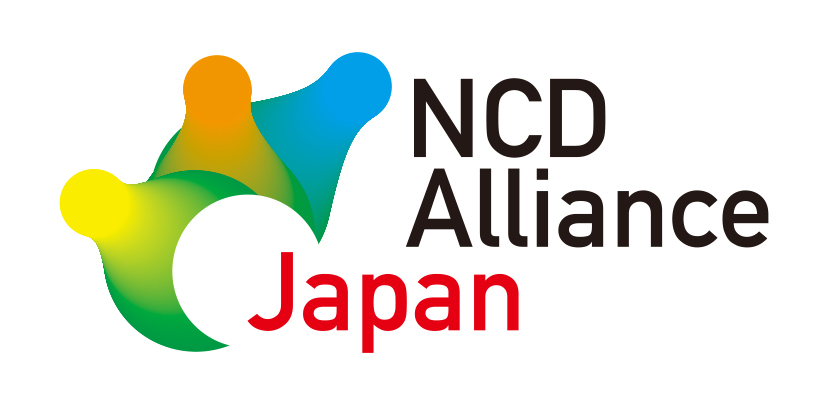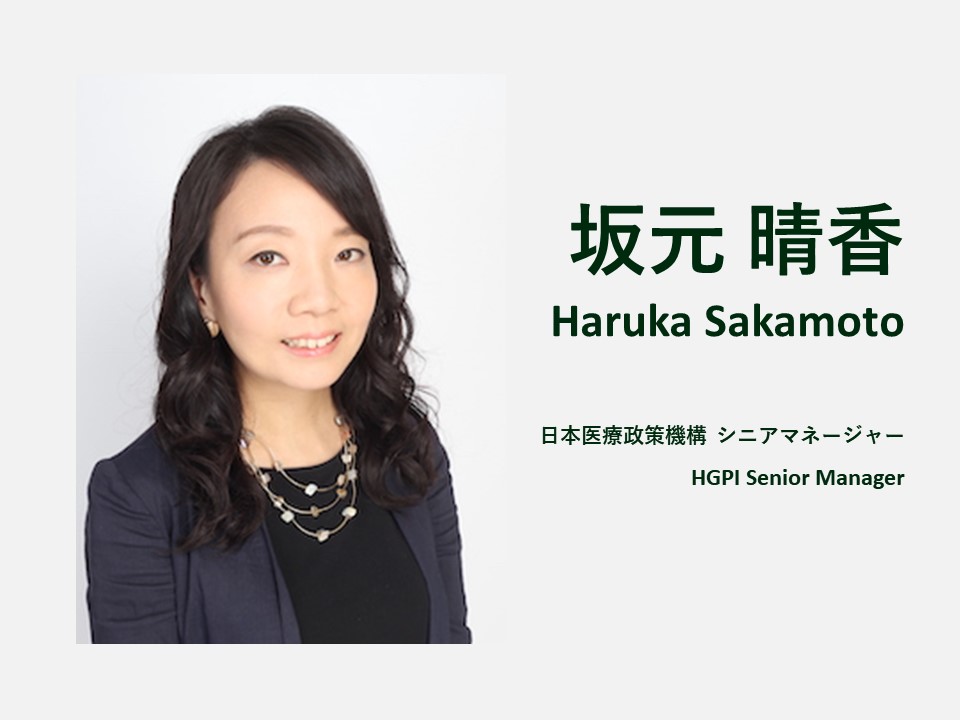Current Activities (April ― June 2023)
CONTENTS
- About Health and Global Policy Institute (HGPI)
- Top Global Health Policy Think Tanks 2020
- HGPI Seminar
- NCDs: Non-Communicable Diseases
- Dementia
- Planetary Health
- Child Health
- The Public and Private Sector Co Creation Hub
- Non-partisan Diet Member Briefing
- AMR: Antimicrobial Resistance
- Special Breakfast Meeting
- Lectures and Media Coverage
- Advocacy Activities to Encourage the Adoption of the Recommendations in Our Policy Proposals
- Providing Professional Expertise
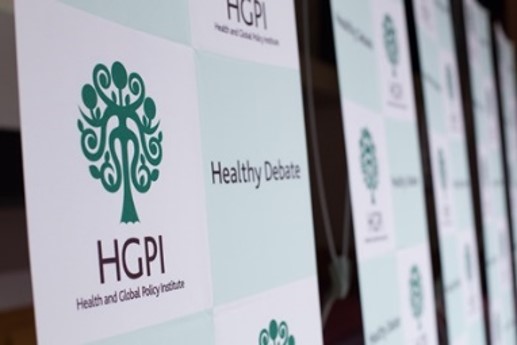
About Health and Global Policy Institute (HGPI)
Non-profit, Independent, and Global
Health and Global Policy Institute (HGPI) is a Tokyo-based independent and non-profit health policy think tank, established in 2004.
Since establishment, HGPI has pursued its mission of “Achieving citizen-centered health policies by bringing broad stakeholders together in its capacity as an independent think-tank to generate policy options for the public.” One of the Institute’s guiding principles in activities for this mission is to hold fast to its independence without adhering to the interests of any political party or organization. HGPI will continue to maintain political neutrality and independence from any organization in conducting its activities.
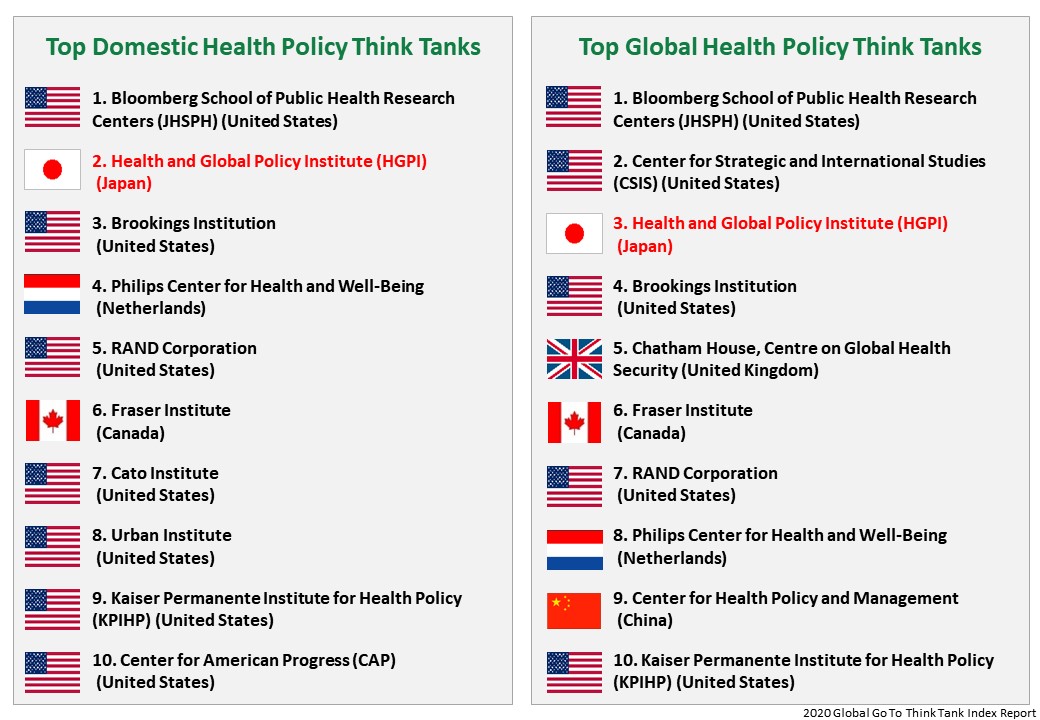
Top Global Health Policy Think Tanks 2020
Ranked Third in the World Among Global Health Policy Think Tanks
HGPI was ranked third among global health policy think tanks worldwide in University of Pennsylvania’s 2020 Global Go To Think Tank Index Report, published in January 2021. HGPI has been included in the ranking for twelve consecutive years, placing it among leading policy organizations.
“HGPI’s ranking is the result of its independence, the diversity of its funding sources, and its commitment to working globally by publishing all of its work in both English and Japanese. Encouraged by these results, we will double our efforts to continue to have a positive impact on society as a think tank specializing in health policy.” –HGPI Chairman Kiyoshi Kurokawa
“Especially during the pandemic, our work to advocate for citizens, patients, and healthcare workers is of the utmost importance. Now, more than ever, the world needs open and fair discussions on health policy. We will continue to foster such discussions, toward the creation of better policy ideas developed out of the combined knowledge of diverse stakeholders from the public and private sectors.” –HGPI CEO and Board Member Ryoji Noritake
HGPI Seminar
2023.06.28
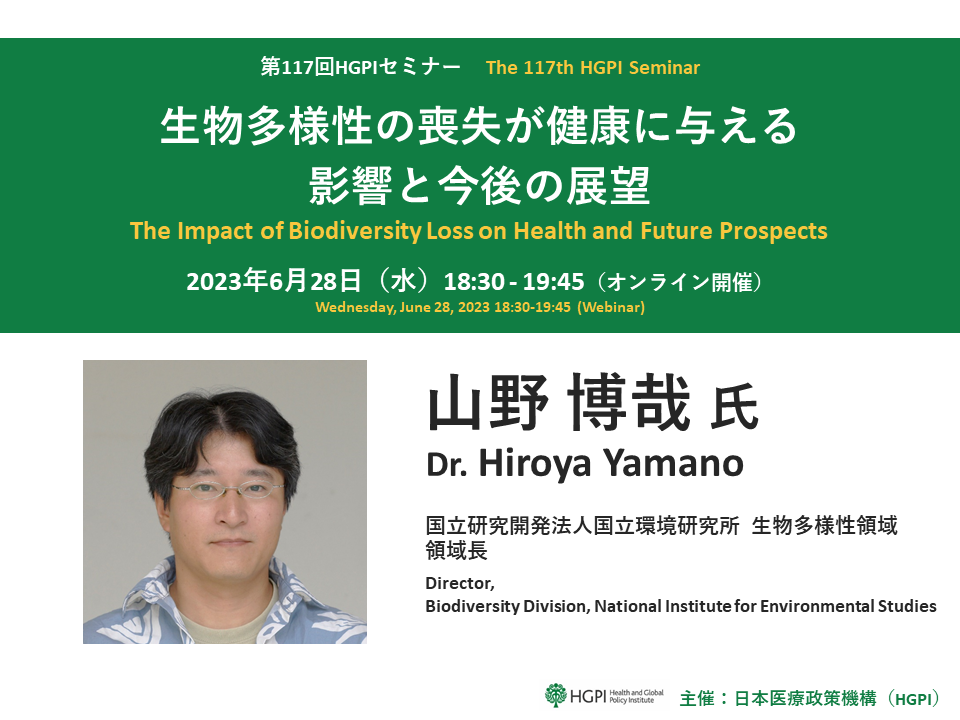
The 117th HGPI Seminar
The Impact of Biodiversity Loss on Health and Future Prospects
We hosted Dr. Hiroya Yamano, Director of the Biodiversity Division of the National Institute for Environmental Studies, Japan (NIES). After an introduction of HGPI activities, Dr. Yamano gave a comprehensive talk on biodiversity and human health.
2023.04.25
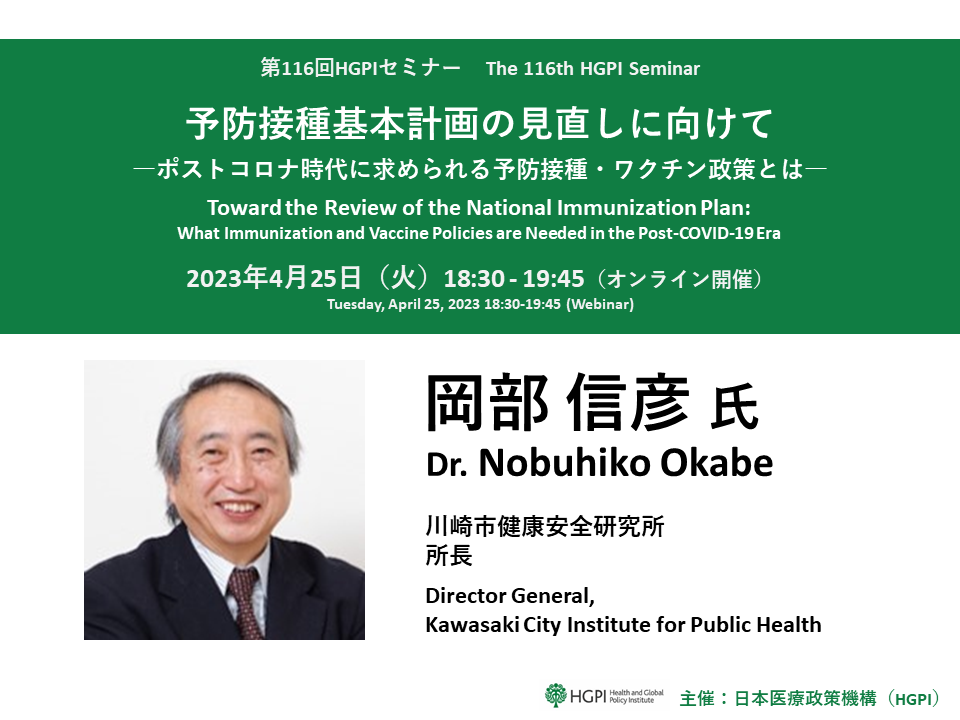
The 116th HGPI Seminar
Toward the Review of the National Immunization Plan: What Immunization and Vaccine Policies are Needed in the Post-COVID-19 Era
We welcomed Dr. Nobuhiko Okabe, Director General of the Kawasaki City Institute for Public Health. Dr. Okabe discussed the issues both in Japan and abroad that have been clarified or left behind by the COVID-19 pandemic. While “catching up” (The Big Catch-Up) we made this an opportunity to comprehensively consider the points to be discussed when proceeding with a review of the National Immunization Plan, toward a system that allows anyone to be vaccinated and vaccinated at any time in their lives.
2023.05.23
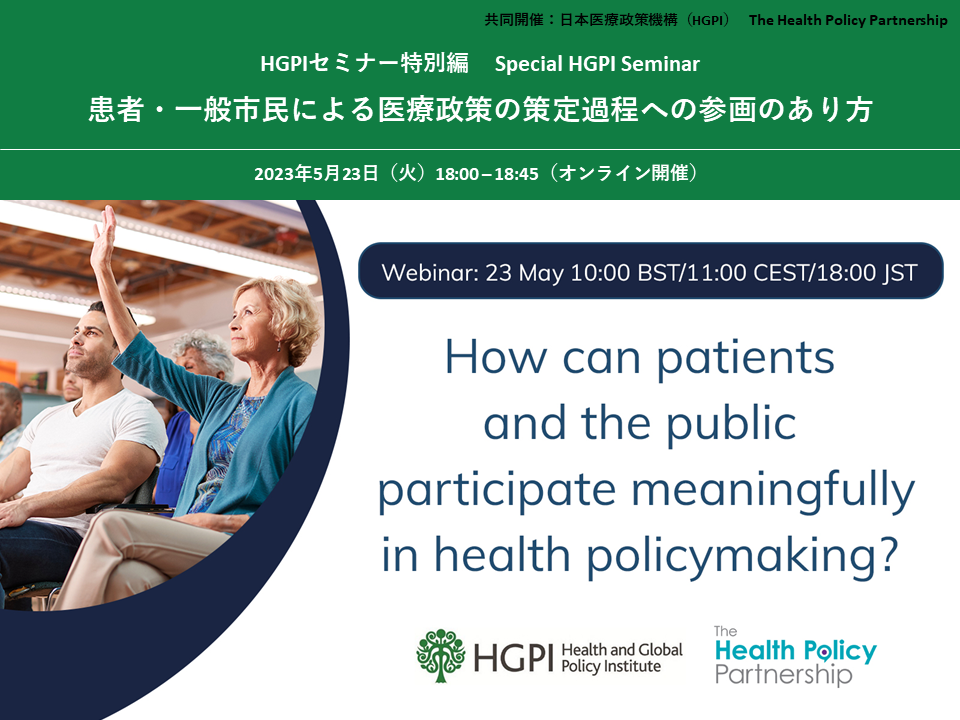
HGPI Special Seminar
How can patients and the public participate meaningfully in health policymaking?
This special HGPI seminar was hosted by HGPI and The Health Policy Partnership, a UK-based health policy think-tank. The webinar provided an opportunity to learn about what is needed to ensure patients and the public can feed into policy design in a meaningful way. Patient advocates and experts in policy discussed the importance of involving patients and the public in health policymaking, lessons learnt from successful engagement in Japan and Europe, and the opportunities for participatory policy development offered by the digitisation of healthcare. We were joined by patient advocates and policy experts, Shinsuke Amano (Group Nexus Japan), Penilla Gunther (FOKUS Patient) and Ryoji Noritake (HGPI). The webinar featured live two-way translation between Japanese and English.
NCDs: Non-Communicable Diseases
NCD Alliance Japan
NCD Alliance Japan is a collaborative platform for civil society organizations in the NCD community steered by the Health and Global Policy Institute. Its aim is to further promote comprehensive, cross-cutting NCD policies. Since 2013, NCD Alliance Japan has served as Japan’s point-of-contact for the NCD Alliance, which brings together over 2,000 civil society organizations and academic institutions in more than 170 countries. NCD Alliance Japan was officially recognized as a full member of the NCD Alliance in January 2019.
2023.05.11
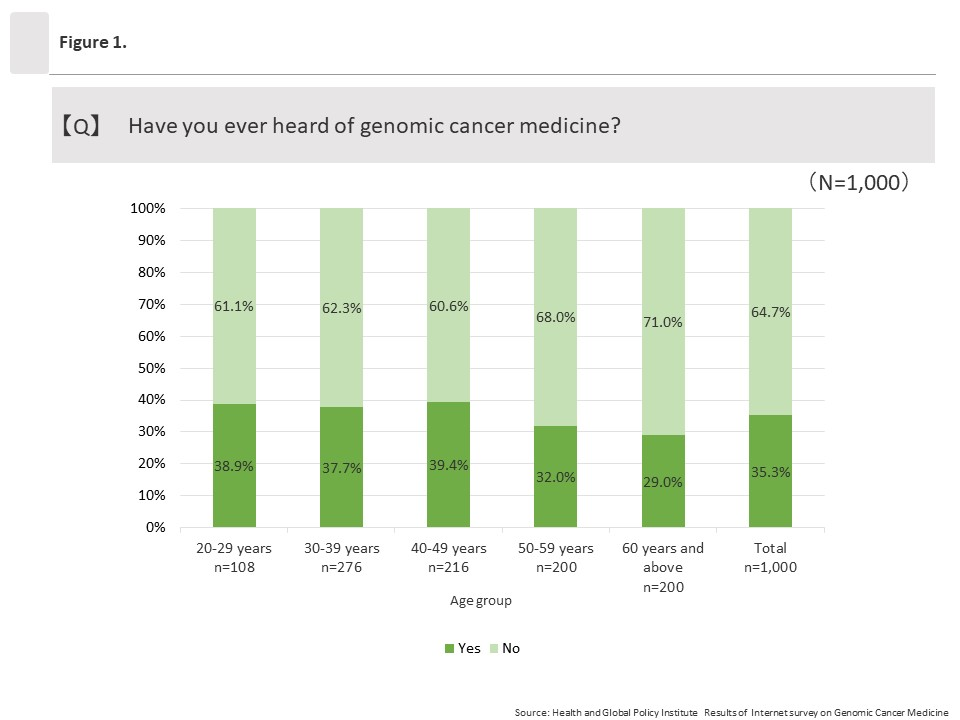
The Project for Considering the Future of Precision Medicine with Industry, Government, Academia, and Civil Society
Results of Internet Survey on Genomic Cancer Medicine (Summary)
The project for Considering the Future of Precision Medicine with Industry, Government, Academia, and Civil Society and the Section of Global Health of the Tokyo Women’s Medical University Department of Hygiene and Public Health conducted an online survey among cancer patients and their families to assess the current status of genomic cancer medicine. Topics it examined included (1) awareness toward genomic cancer medicine, (2) awareness toward cancer gene panel testing, and (3) access to cancer gene panel testing.
Key Survey Findings
- Among individuals who have been diagnosed with cancer or have had a family member who was diagnosed with cancer within the past five years, 40% of respondents had heard of genomic cancer medicine.
- Compared to other age groups, respondents in the group age 60 years and older were less likely to have heard of “genomic cancer medicine” or “cancer gene panel testing,” or to have received explanations about genomic cancer medicine from physicians.
2023.04.25
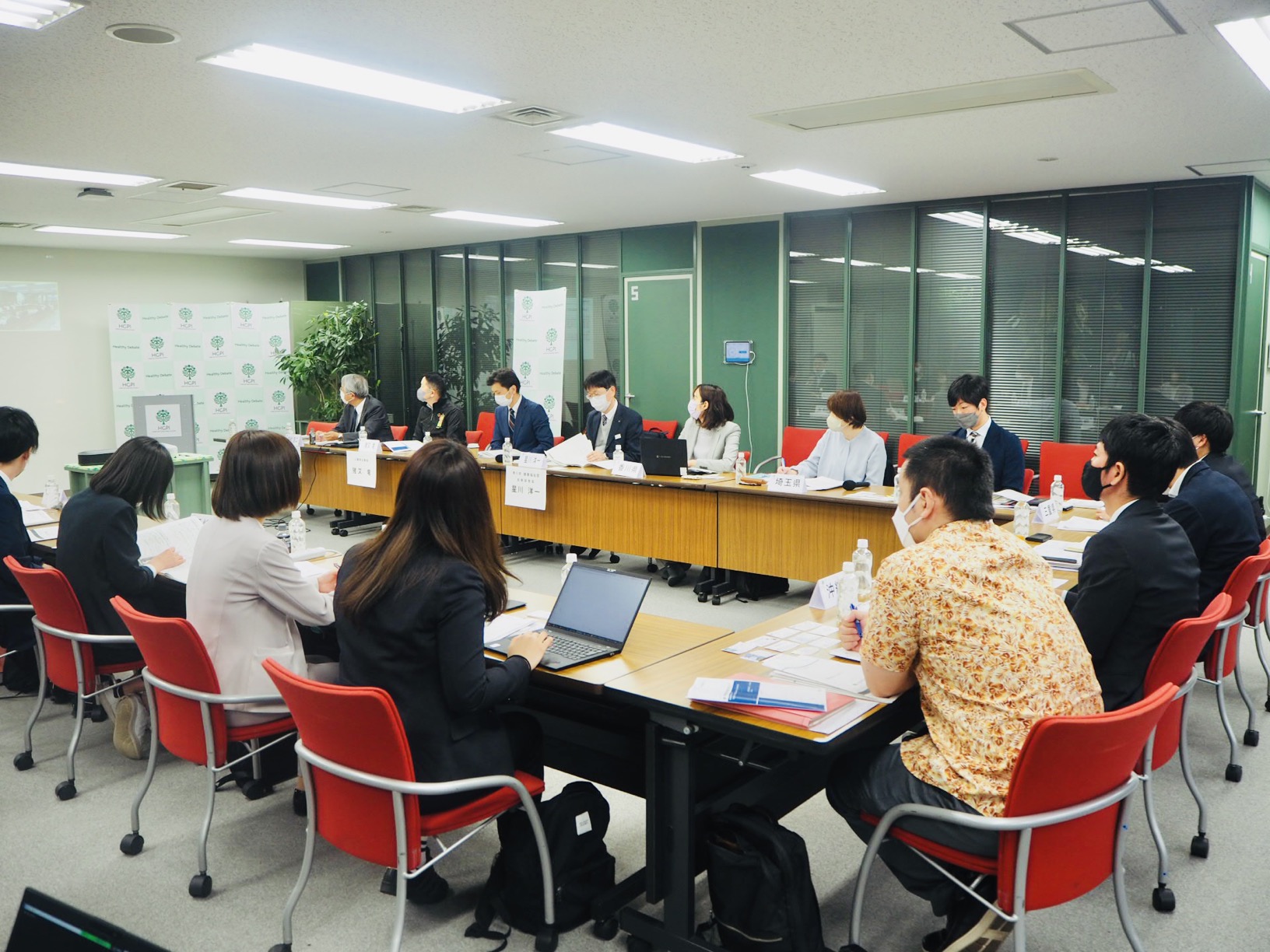
The Cardiovascular Disease (CVD) Control Promotion Project
Nationwide Summit for Promoting CVD Control
The CVD Control Promotion Project hosted an event titled the “Nationwide Summit for Promoting CVD Control.” The objective of this Summit was to contribute to the effective and smooth promotion of CVD control measures in each prefecture, to share best practices among regions, and to exchange opinions on CVD control. The Summit was attended by officials in charge of CVD control measures from 38 prefectures. Together, we discussed progress, issues, and future prospects for CVD control in each of their respective prefectures.
Dementia
2023.05.28
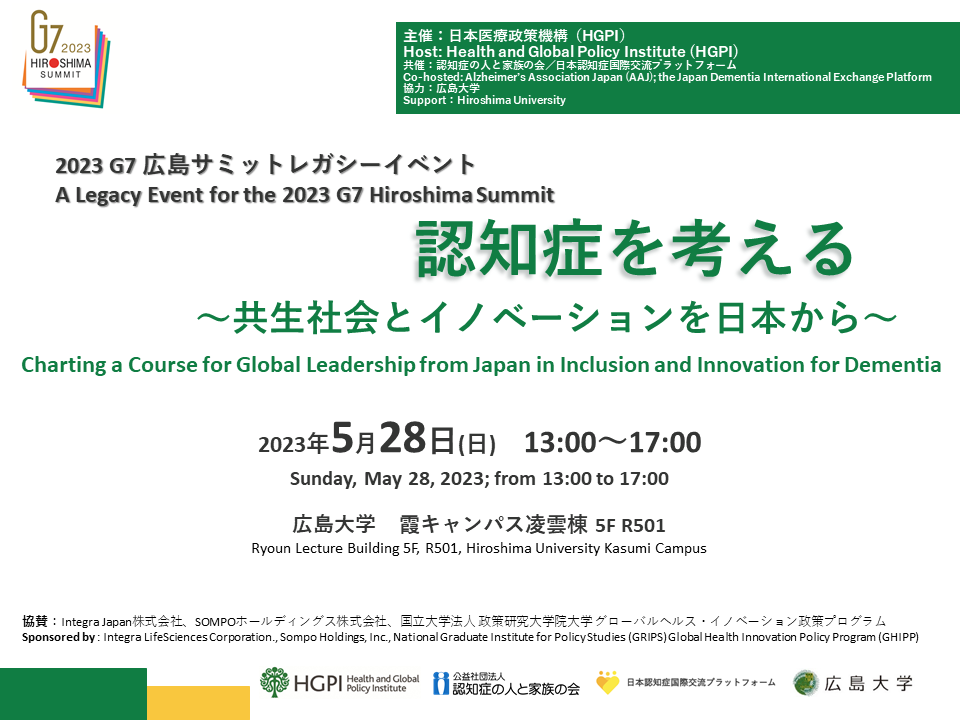
A Legacy Event for the 2023 G7 Hiroshima Summit
Charting a Course for Global Leadership from Japan in Inclusion and Innovation for Dementia
Recognizing that Japan must lead the international community in building an inclusive society and in innovation, this symposium deepened discussions from these perspectives to examine the latest initiatives, issues, and future prospects for dementia as a policy issue at the global level.
Participants
Shinya Ishii (Specially–appointed Professor, Symbiotic Social Medicine Course, Graduate School of Medicine, Hiroshima University)
Noriyo Washizu (Director, AAJ)
Kousuke Wada (Director for Dementia Strategy, Division of Dementia Policy and Community-Based Long-Term Care Promotion, Health and Welfare Bureau for the Elderly, Ministry of Health, Labour and Welfare (MHLW))
Takeshi Iwatsubo (Professor, Department of Basic Neuroscience, Department of Neurology, Graduate School of Medicine, The University of Tokyo; Chairman, Japan Society for Dementia Research)
Junko Amano (Executive Director, Hiroshima Medical Association)
Shuichi Awata (Director, Integrated Research Initiative for Living Well with Dementia, Tokyo Metropolitan Geriatric Hospital and Institute of Gerontology)
Ryoko Ihara (Head Physician, Department of Neurology, Tokyo Metropolitan Geriatric Hospital and Institute of Gerontology)
Motoharu Kawai (Director, AAJ; Representative Manager, Yamaguchi Branch, AAJ; Vice Director, Neuromuscular Center Yoshimizu Hospital)
Haruhiko Kishima (Professor and Chairman, Department of Neurosurgery, Osaka University Graduate School of Medicine; Director, International Medical and Engineering Information Center, Osaka University)
Takashi Sakurai (Professor, Department of Prevention and Care Science, Center for Development of Advanced Medicine for Dementia, National Center for Geriatrics and Gerontology)
Taisuke Hashimoto (Director, Healthcare Industries Division, Commerce and Service Industry Policy Group, Ministry of Economy, Trade and Industry (METI))
Keiko Murakami (Caregiver Representative, Hiroshima Branch, AAJ)
Junko Tanaka (Executive Vice President, Hiroshima University)
2023.05.14
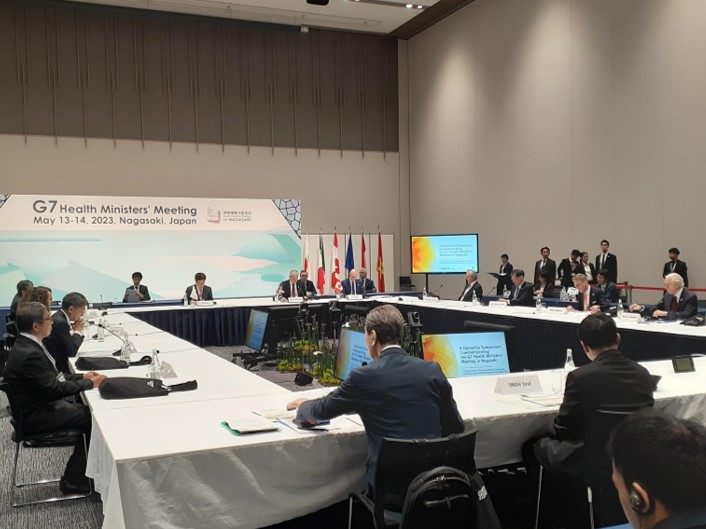
A Dementia Symposium Commemorating the G7 Health Ministers’ Meeting in Nagasaki
Collaboration in the International Community for Advancing Dementia Measures in a New Era
A Dementia Symposium Commemorating the G7 Health Ministers’ Meeting in Nagasaki “Collaboration in the International Community for Advancing Dementia Measures in a New Era” was hosted by the Japanese Ministry of Health, Labour and Welfare (MHLW) with supports of World Dementia Council (WDC) and HGPI.
Participants
Kazuko Fujita (CEO, Japan Dementia Working Group (JDWG))
Morio Suzuki (President, Alzheimer’s Association Japan)
Yutaka Tanaka (KIBO TAISHI of Nagasaki Prefecture)
Kenji Toba (CEO, Tokyo Metropolitan Geriatric Hospital and Institute of Gerontology)
Paola Barbarino (CEO, Alzheimer’s Disease International (ADI))
Shuichi Awata (President, Integrated Research Initiative for Living Well with Dementia, Tokyo Metropolitan Geriatric Hospital and Institute of Gerontology)
Joanne Pike (President and CEO, Alzheimer’s Association)
Fiona Carragher (Director of Research and Influencing, Alzheimer’s Society)
Haruhiko Akiyama (Japan Agency for Medical Research and Development (AMED))
Takeshi Iwatsubo (Professor, Department of Basic Neuroscience, Department of Neurology, Graduate School of Medicine, The University of Tokyo)
Bart De Strooper (Professor, UK Dementia Research Institute, University College London)
Philip Scheltens (Chair, World Dementia Council (WDC))
George Vradenburg (Founding Chairman, Davos Alzheimer’s Collaborative (DAC))
Lenny Shallcross (Executive Director, WDC)
2023.04.25
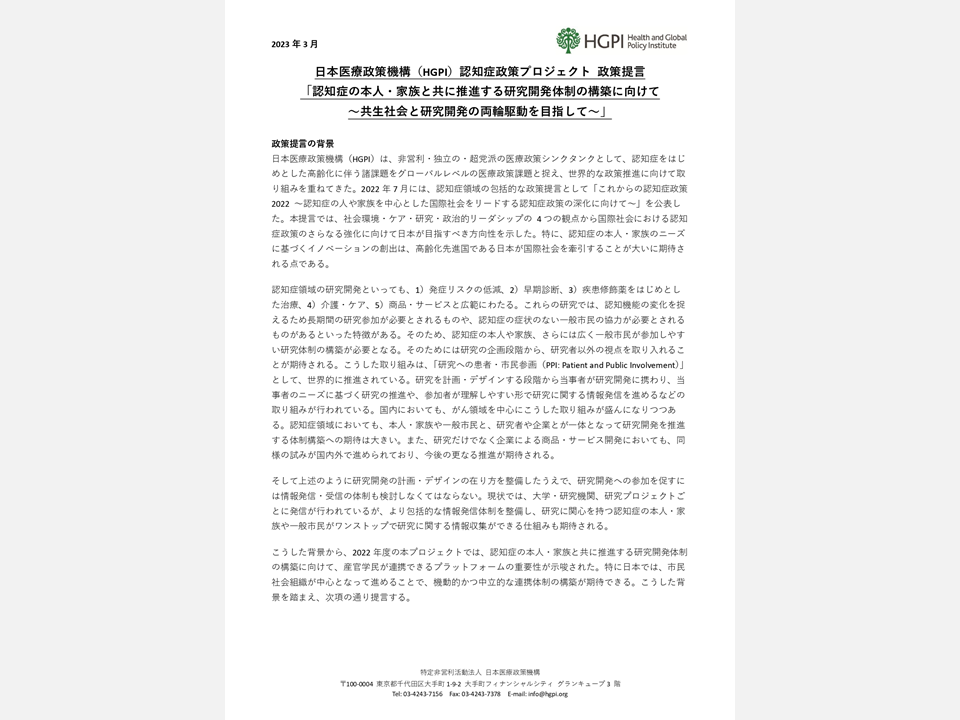
Recommendations
Building a Research and Development System Together With People Living with Dementia and Their Families to Drive Parallel Progress in Creating an Inclusive Society and Advancing R&D
The recommendations were complied by HGPI independently based on discussions of Roundtable Discussions and Symposium we held this year.
Recommendations:
To achieve innovations in dementia that are based on the needs of people living with dementia, their families, and citizens, a collaborative platform centered on civil society should be established.
Anticipated features for the collaborative platform:
- Features that promote Patient and Public Involvement (PPI) and PPI-centered development
- Features that provide suitable support and easy access to information regarding research programs to all participants
- “Participant first” and “Family first” features that provide access to care through research program participation
- Features that enable two-way feedback among participants and researchers after research programs are concluded and that create communities that last
- Features that allow opinions on and evaluations of innovations that have been introduced to be accumulated and utilized to contribute to further improvements
Planetary Health
2023.05.12
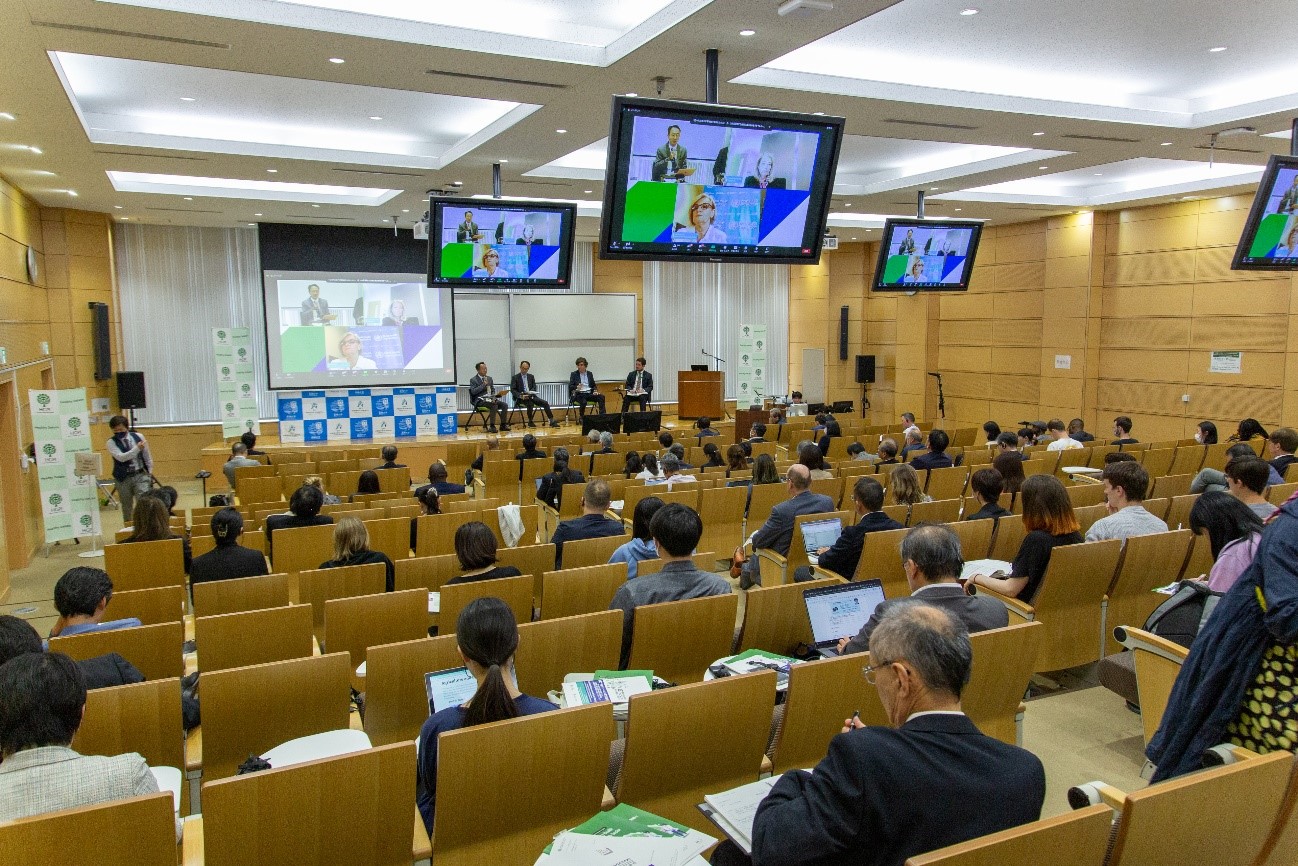
A NAGASAKI Planetary Health Expert Meeting
From COP27 and COP15 to the G7 Hiroshima Summit: New Partnerships for Solving Climate, Environment, Biodiversity and Health Issues
The purpose of this meeting was to promote awareness and understanding of the linkage between the global environment, including climate change and human health, by having domestic and international experts share their discussions at the 27th Conference of the Parties (COP27) to the United Nations Framework Convention on Climate Change (UNFCCC) and the 15th Conference of the Parties (COP15) to the UN Convention on Biological Diversity (UNCBD), and to foster an environment for discussion in preparation for the G7 Summit to be held in Hiroshima in 2023, the G7 Nagasaki Ministerial Conference on Health, and other related high-level meetings.
Participants
Alan Dangour (Director of Climate and Health, Wellcome Trust)
Pam Cheng (Executive Vice President of Global Operations and IT, Chief Sustainability Officer at AstraZeneca)
Masahiro Hashizume (Professor of International Health Policy, School of International Health, Graduate School of Medicine, University of Tokyo)
Keisuke Nansai (Director, Global Resource Sustainability Research Section, National Institute for Environmental Studies)
Maria Neira (Director, Department of Environment, Climate Change and Health, World Health Organization)
Juliette White CBE (Vice President Global SHE and Sustainability, AstraZeneca)
Shigeru Kohno (President, Nagasaki University)
Kazuhiko Takeuchi (President, Institute for Global Environmental Strategies (IGES))
Tony Capon(Professor, Monash Sustainable Development Institute, Monash University)
Makoto Haraguchi (Fellow, MS&AD InterRisk Research & Consulting, Inc.; TNFD dedicated SVP, MS&AD Insurance Group Holdings, Inc.)
Fumiko Kasuga (Global Hub Director, Japan Hub, Future Earth)
Hiroya Yamano (Director, Biodiversity Division, National Institute for Environmental Studies)
Moeko Yoshitomi (Deputy Director, Office of Global Health Cooperation, International Affairs Division, Ministry of Health, Labour and Welfare; Assistant Director, Water Supply Division, Pharmaceutical Safety and Environmental Health Bureau; International Affairs Team, Novel Coronavirus Response Headquarters)
Chiho Watanabe (Dean, Interfaculty Initiative in Planetary Health; Professor, School of Tropical Medicine and Global Health, Nagasaki University)
Margaret Tongue (Minister-Counsellor for Economic Affairs, the British Embassy in Tokyo)
Kozo Akino (Member of the House of Councillors; State Minister of Finance)
2023.04.25
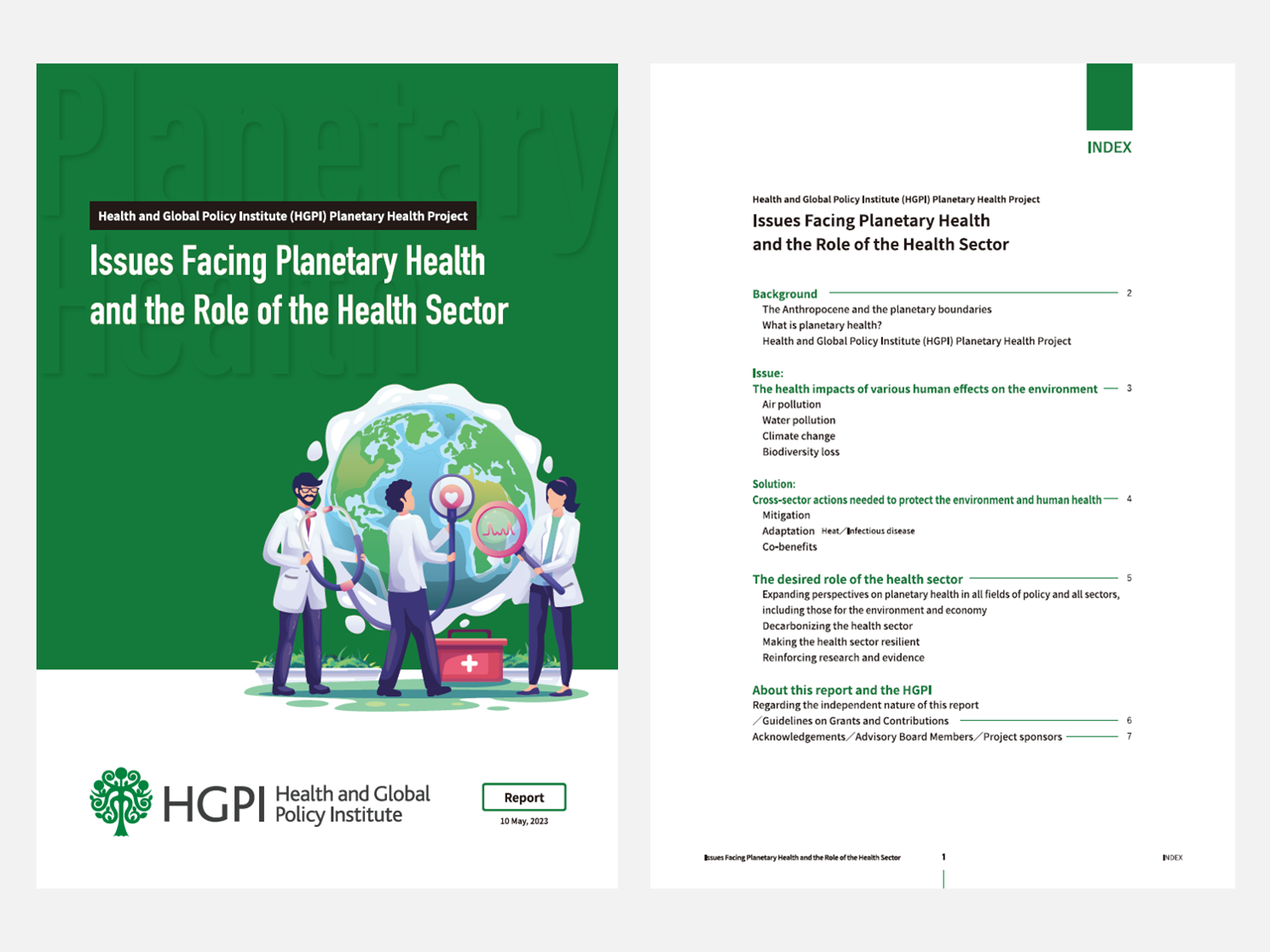
Publication Report
Issues Facing Planetary Health and the Role of the Health Sector
This report focuses on the health impacts of various human effects on the environment and analyzes actions needed to protect the environment and human health, as well as the desired role of the health sector.
[Index]
Background
The Anthropocene and the planetary boundaries
What is planetary health?
Health and Global Policy Institute’s Planetary Health Promotion ProjectIssue: The health impacts of various human effects on the environment
Air pollution
Water pollution
Climate change
Biodiversity lossSolution: Cross-sector actions needed to protect the environment and human health
Mitigation
Adaptation Heat/Infectious disease
Co-benefitsThe desired role of the health sector
Expanding perspectives on planetary health in all fields of policy and all sectors, including those for the environment and economy
Decarbonizing the health sector
Making the health sector resilient
Reinforcing research and evidenceAbout this report and the HGPI
Regarding the independent nature of this report/Guidelines on Grants and Contributions
Acknowledgements/Advisory Board Members/Project sponsors
Advisory Board Members
Ryoka Imai (Associate Director, Public Affairs, Market Access, Public Affairs & Patient Experience, Takeda Pharmaceutical Company Limited)
Masahiro Kaminota (Director-General, Environmental Health Department, Minister’s Secretariat, Ministry of the Environment)
Eiji Hinoshita (Assistant Minister for Global Health and Welfare, Ministry of Health, Labour and Welfare)
So Sugawara (Representative Director, Green innovation)
Yasuhiko Suzuki (Distinguished Professor, Hokkaido University; Professor, International Institute for Zoonosis Control Division of Bioresources, Hokkaido University)
Keiko Nakamura (Professor, Department of Global Health Entrepreneurship, Graduate School of Medical and Dental Sciences (Medicine), Tokyo Medical and Dental University)
Masahiro Hashizume (Professor, Department of Global Health Policy, School of International Health, Graduate School of Medicine, The University of Tokyo)
Hidekazu Hosokawa (Executive Director, Japan Medical Association)
Yusuke Matsuo (Director, Business Task Force, Institute for Global Environmental Strategies)
Yutaka Mitsutake (Director, Japan Sustainability, AstraZeneca K.K.)
Hiroya Yamano (Director, Biodiversity Division, National Institute for Environmental Studies)
Chiho Watanabe (Dean, Interfaculty Initiative in Planetary Health; Professor / School of Tropical Medicine and GlobalHealth, Nagasaki University)Observer
Akiyo Kizawa (Executive Officer, Japanese Nursing Association (JNA))
Guest Speaker
Naoko Yamamoto (Professor, Graduate School of Public Health, International University of Health and Welfare/Former Assistant Director-General, Universal Health Coverage/Healthier Populations, World Health Organization)
2023.04.20
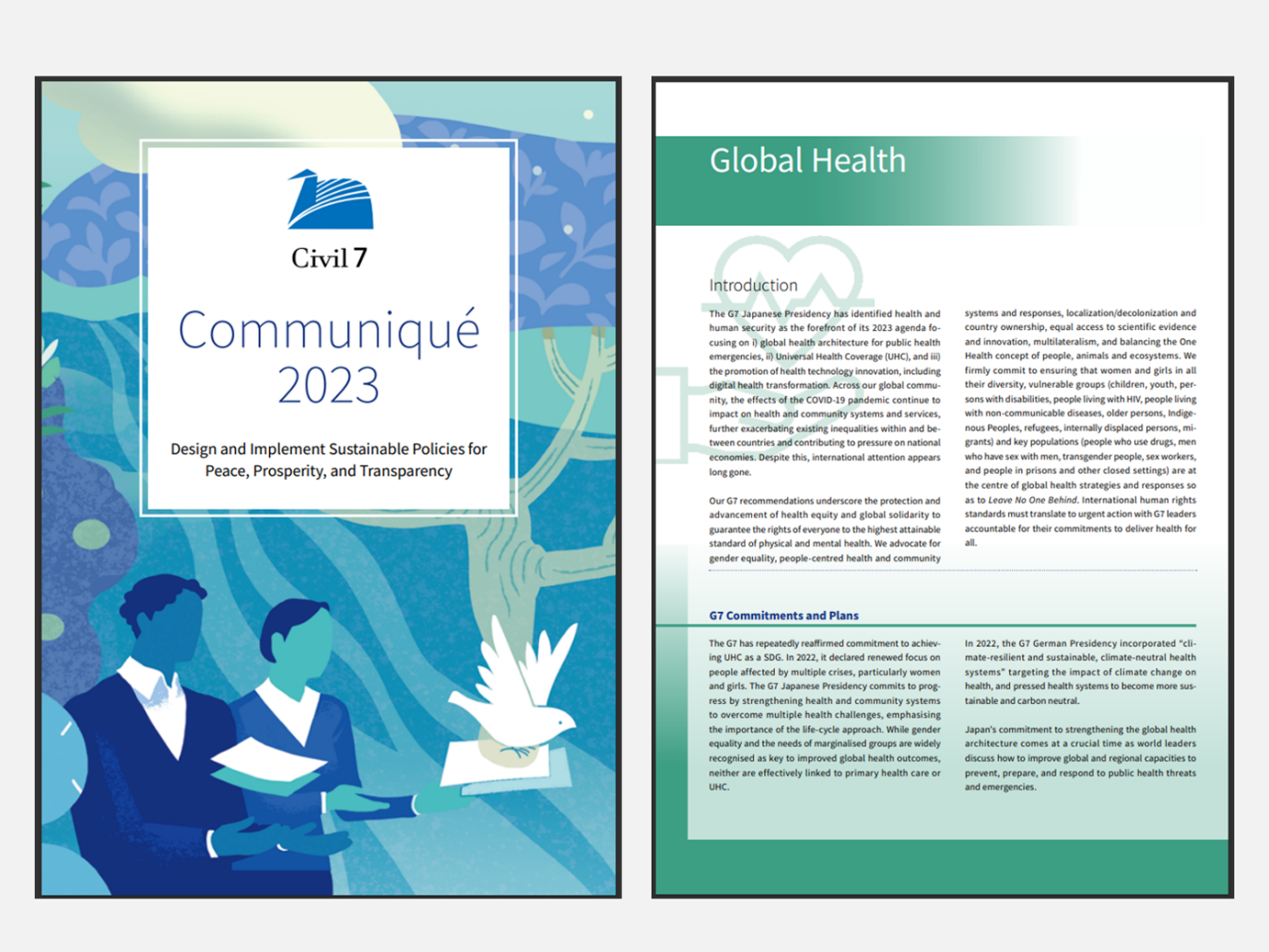
Policy Recommendations
Recommendations for the G7 Hiroshima Summit by the C7 Global Health Working Group
The Planetary Health Policy Team collaborated to the development of the Planetary Health portion of the recommendation released by the C7 Global Health Working Group.
Planetary Health
Planetary boundaries are thresholds of environmental stability beyond which abrupt and irreversible changes may occur. Crossing them risks catastrophic consequences for humanity’s ability to thrive on Earth. Therefore, we highlight current challenges such as climate crisis, food security, and environmental pollution.
We urge the G7 to:
- Strengthen inclusive and accountable climate finance, prioritizing planetary health in health policies, and prioritizing co-beneficial policies of the environment and health to tackle climate change.
- Pursue food security and nutrition and shift to sustainable food systems through intersectoral collaboration across health and agricultural sectors while respectfully incorporating Indigenous perspectives.
- Reduce environmental pollution, reduce reliance on fossil fuels, promote clean and environmentally friendly transportation systems, and regulate pollutants in urban areas.
- Accelerate contributions through global partners and invest in climate and disaster resilient sustainable quality infrastructure as necessary to achieving climate commitments and the SDGs.
2023.04.07
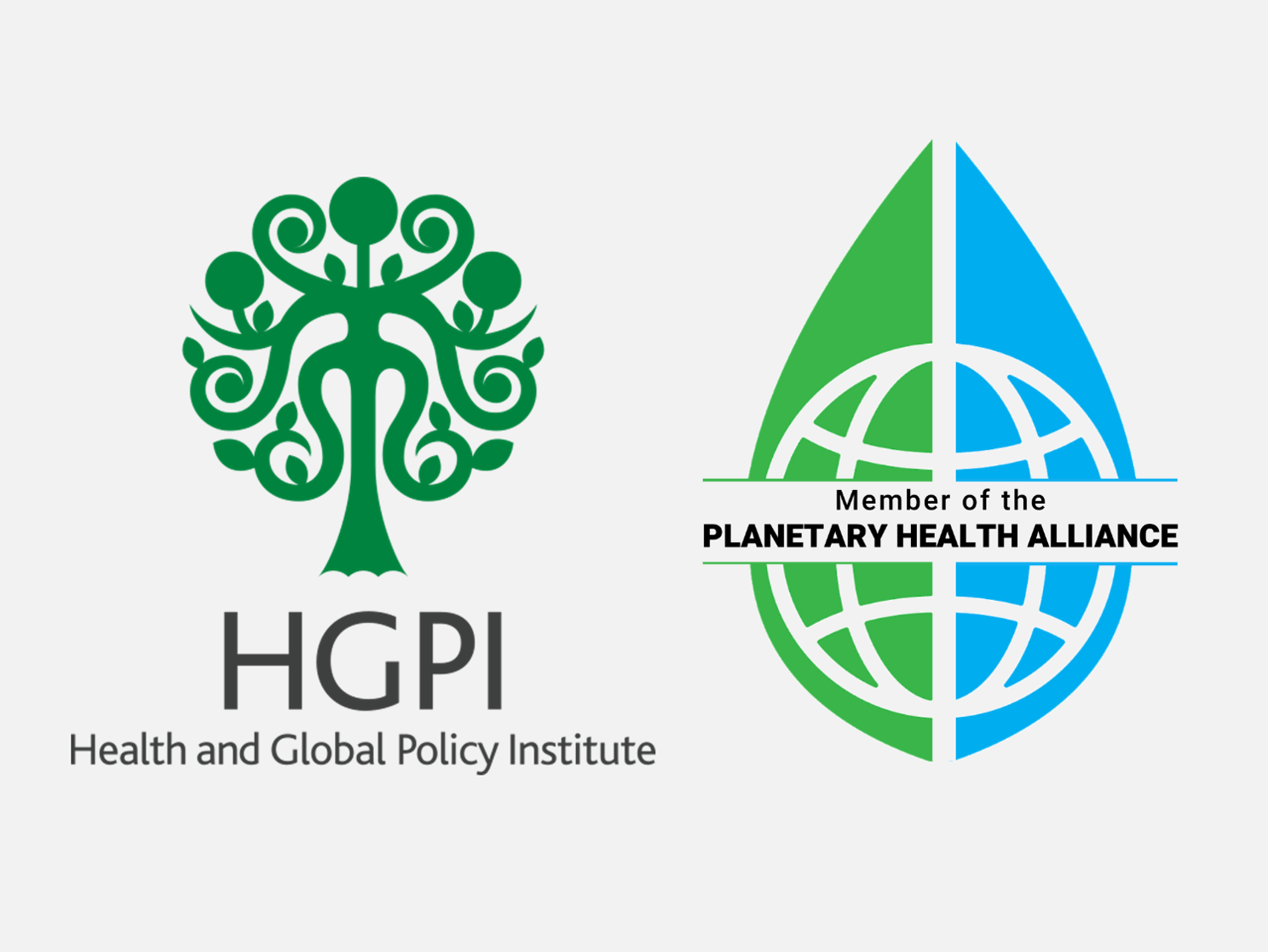
HGPI Joins Planetary Health Alliance
HGPI has officially joined the Planetary Health Alliance (PHA) , a consortium of over 300 universities, non-governmental organizations, research institutes, and government entities from around the world committed to understanding and addressing global environmental change and its health impacts.
Child Health
2023.04.06
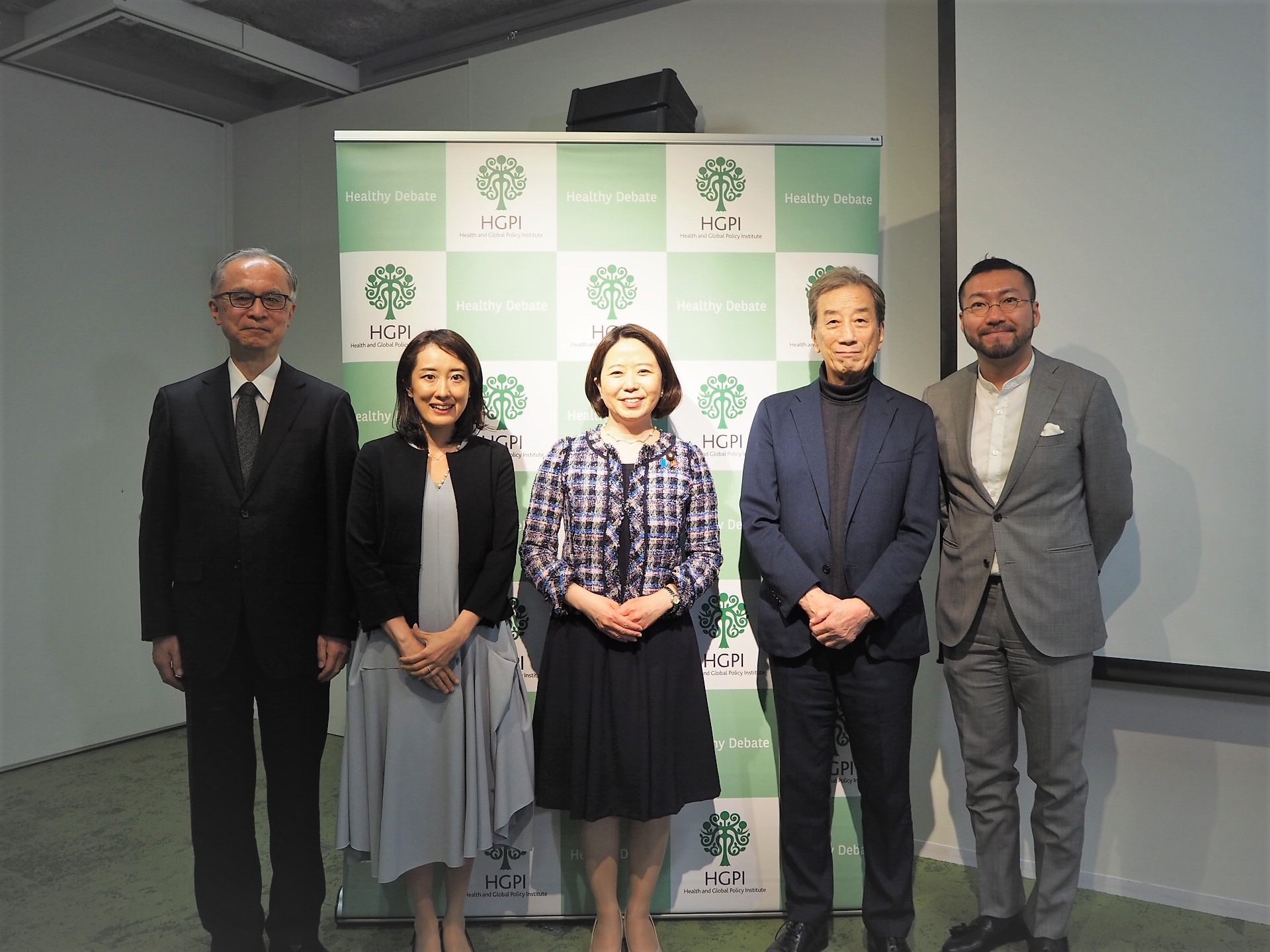
Public Forum
Challenges and Future Prospects for Promoting a Different Dimension of Policies for Children
HGPI has launched the Child Health Project and presented urgent recommendations entitled “Challenges and Prospects for the Implementation and Execution of the Basic Law and Basic Policy for Child and Maternal Health and Development” in February 2023. To broadly publicize these policy recommendations and intensify discussions on this topic, HGPI hosted a public forum that featured a keynote lecture from Prof. Takashi Igarashi (President and Chief Executive Officer, National Center for Child Health and Development). Prof. Igarashi has worked to advance policies for child health for many years and guided our efforts as a special advisor for HGPI’s Child Health Project. In addition, Dr. Hanako Jimi, a member of the House of Councilors and co-chair of the Children First Study Group on Child and Family Administration, spoke on “Achieving a “Children First” Society”. Dr. Sonoko Sensaki (Assistant Director, Children’s Think Tank Planning and Coordination Office, National Center for Child Health and Development), a former medical technical officer at the Ministry of Health, Labour and Welfare and a specialist in pediatrics, also spoke at the public forum.
POINTS
- Child policy is an issue that requires the participation of diverse stakeholders, not limited to those involved in pediatric medicine, to provide comprehensive recommendations and solutions from a societal perspective.
- There have been bottlenecks in the process of implementing policy based on research results, and it is important to increase opportunities for cross-referencing among municipalities (horizontal expansion of good practices). Furthermore, since promoting digital health and developing private businesses to supplement public support is challenging for local governments alone, it is crucial to encourage collaboration among industry, government, academia, and the private sector under the leadership of the national government.
- In 1988, the World Health Organization (WHO) defined “health” as “a state of complete physical, mental and social well-being.” Although Japan ranks first in physical health among the 38 OECD member countries, its psychological health ranks 37th and social health ranks 27th. While Japanese pediatric healthcare has prioritized the improvement of physical health, it is crucial to focus on all three aspects and promote “biopsychosocial” health in the future.
- For instance, given the lack of mechanisms to assess and support children’s mental health and social skills in Japan, it is imperative to establish a system that supports children and families in terms of their biopsychosocial well-being and addresses potential risks through measures such as improved school and individual assessments.
- While the Children and Families Agency aims to provide seamless and comprehensive support that crosses age and institutional barriers, it currently lacks policy areas that follow maternal and child health. To ensure sustainable support, it is necessary to develop “child and adolescent health” and collaborate with school health to promote continuous and comprehensive support.
- In establishing the Children and Families Agency and promoting children’s policies, it is crucial to ensure strong authority and budget allocation under a full-time minister and take the political lead. The concept of “integrated biopsychosocial guarantee” will be shared within the Children and Families Agency, and it is expected to be incorporated into the National Children’s Program Outline, which will be approved by the Cabinet in the fall of 2023. It is of utmost importance to maintain the “integrated” nature of biopsychosocial and to promote understanding so that it is not separated into its physical, psychological, and social aspects in the future.
- The “right of children to express their opinions” stipulated in the Basic Law for Children is a very important right, and from April 1, 2023, national and local governments must be “mandated” to take children’s opinions into account in their policies for children. It is essential to listen to children’s voices, regardless of their age and developmental stage, as well as the views of parents involved in their upbringing.
The Public and Private Sector Co Creation Hub
2023.04.26
Young Professionals’ Roundtable for Public-Private Opinion Exchange on Social Security and Healthcare Policy
The First Meeting “Expert Panel on Comprehensive Measures for Prompt and Stable Supply of Pharmaceuticals”
The Public and Private Sector Co Creation Hub and HGPI co-hosted the third Young Professionals’ Roundtable for Public-Private Opinion Exchange on Social Security and Healthcare Policy. To begin the roundtable, Mr Go Yamamoto (Director, Venture Support Strategy Office, Policy Planning Division for Pharmaceutical Industry Promotion and Medical Information Management, Health Policy Bureau, Ministry of Health, Labour and Welfare) and Mr. Daichi Mitani (Health Policy Bureau, Ministry of Health, Labour and Welfare) explained the background to the establishment of the “Expert Panel on Comprehensive Measures for Prompt and Stable Supply of Pharmaceuticals” and the process of its discussion, the challenges it’s faced and the future direction for better measures.
Non-partisan Diet Member Briefing
2023.06.09
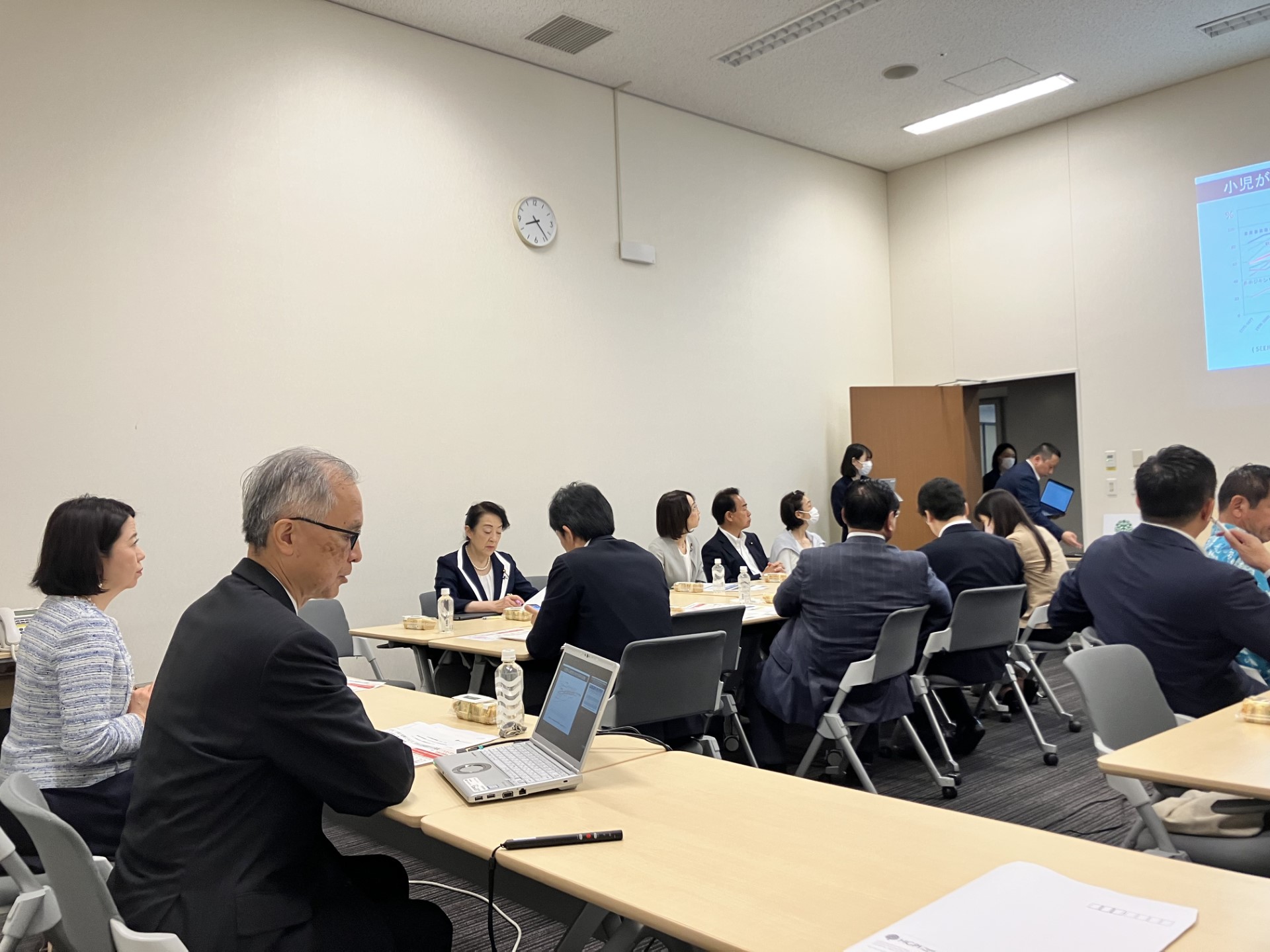
Non-partisan Diet Member Briefing – 30-minute Health Policy Update
Children’s Health – Challenges and Prospects for Implementing and Executing the Basic Law and Basic Plan for Child Health Based on HGPI’s Urgent Recommendations
This installment featured a lecture from Mr. Takashi Igarashi, who serves as President of the National Center for Child Health and Development. He provided insights on the current state of health and medical care for children in Japan, highlighted policy issues, and outlined a vision for the future to effectively address challenges in this area.
Key points of the lecture
- The World Health Organization (WHO) defined “health” as “a state of complete physical, mental and social well-being.” Although Japan ranks first in physical health for children among the 38 OECD member countries, it is ranked 37th for mental health and 27th for social health.
- Two key challenges facing child health in Japan are the high prevalence of low weight births and the high rate of relative poverty, both of which can result in negative effects on physical, mental, and social health for children.
- While there are systems in place to support the physical health of children, such as school-based health checkups, Japan has weak systems for supporting children’s mental health and social well-being. It will be necessary to support children and their families from a biopsychosocial (BPS) perspective that encompasses all aspects of physical, mental, and social health and to build a system that can respond to future risks to children’s health.
- While the Children and Families Agency aims to provide seamless and comprehensive support to all age groups and in a manner that surpasses institutional barriers, health policies that focus on the period following school age are still insufficient.
- In the field of maternal and child health, there are a number of areas where assistance and measures are insufficient. In particular, measures for three following areas must be enhanced:
(1) Expand support so it reaches all family members, including women during pregnancy and childbirth.
(2) Disseminate painless delivery in Japan by collecting and promoting research and case studies to standardize practices in the future.
(3) Promptly introduce mass screenings for newborns that are scientifically sound and proven to be effective in the healthcare system.
2023.04.11
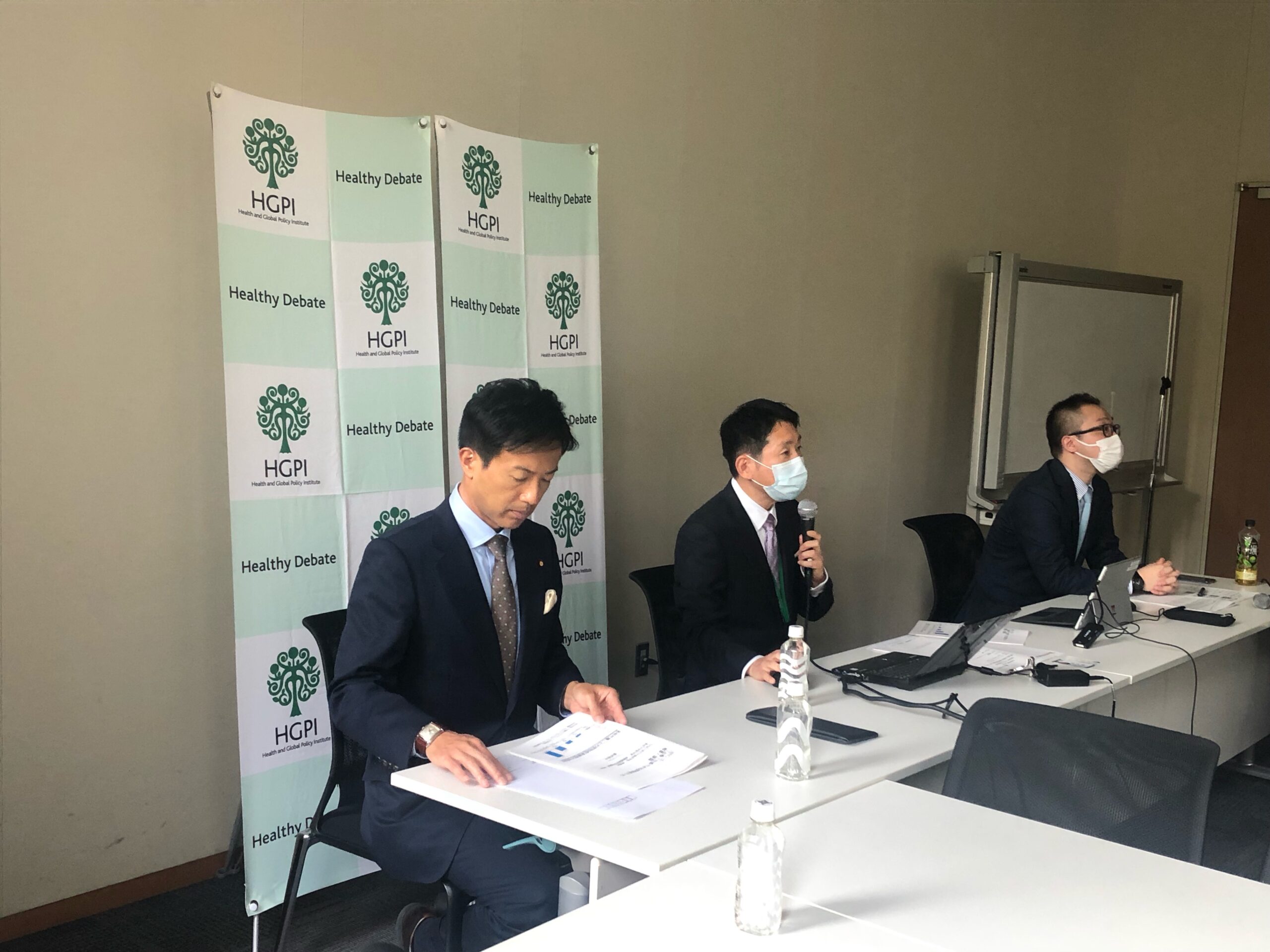
Non-partisan Diet Member Briefing – 30-minute Health Policy Update
“Introducing Idiopathic Normal Pressure Hydrocephalus (iNPH), a Form of Dementia That Can Improve With Treatment”
The study session featured a lecture from Professor Hiroaki Kazui (Professor, Department of Neuropsychiatry, Kochi Medical School; Chairman, The Japanese Society of NPH) which provided an explanation of the current circumstances and issues for iNPH, a condition viewed as a form of dementia that can be treated.
Key points of the lecture
- It is important to diagnose dementia early and provide treatments that are based on its underlying causes. Diagnosis must be performed from the two perspectives of disease prevalence and treatability. It is particularly important that a treatable form of dementia called idiopathic Normal Pressure Hydrocephalus (iNPH) does not go overlooked.
- Normal Pressure Hydrocephalus (NPH) is a disease that presents the triad symptoms of cognitive impairment, gait disturbance, and urinary incontinence. While cerebrospinal fluid (CSF) pressure is within normal range, people with NPH have excessive intracranial CSF build-up and enlarged ventricles. All three symptoms of NPH improve with shunt surgery, so it is now the subject of attention as a treatable form of dementia. iNPH is a form of NPH that appears and progresses gradually and has no known underlying causes. iNPH is often mistaken for Alzheimer’s disease or other changes caused by aging, which sometimes delays diagnosis and treatment.
- The Guidelines for Management of Idiopathic Normal Pressure Hydrocephalus (Third Edition) categorizes diagnostic criteria for iNPH in four stages. Among these stages, it is particularly important to diagnose “Probable iNPH” so shunt surgery can be considered. “Probable iNPH” refers to cases in which patients’ symptoms improve after undergoing a CSF tap test and/or drainage test, or in which they exhibit gait disturbance and their neuroimaging features include narrowing of the sulci and subarachnoid space over the high-convexity/midline surface (known as Disproportionately Enlarged Subarachnoid-Space Hydrocephalus, or DESH). iNPH with DESH has a high improvement rate with shunt surgery.
- Previous studies have shown that the milder the impairments caused by the triad symptoms are before shunt surgery, the more relief of objective symptoms patients experience after surgery. This is why it is considered best to perform shunt surgery for patients with iNPH during the early stages to ensure they can live independently after the procedure. Doing so is also considered important for lightening the burden of providing long-term care that is placed on their family members. However, when iNPH is comorbid with Alzheimer’s disease, other forms of dementia, or other diseases, it may be impossible for patients to receive the full benefits of shunt surgery. This means diagnosing comorbid conditions is as important as differential diagnosis.
- Future challenges for iNPH include promoting early diagnosis, increasing the number of centers that can perform shunt procedures, conducting surveys to grasp real-world conditions surrounding the prevalence of iNPH and its treatment, and establishing a sufficient healthcare provision system. Although an increasing number of health institutions are beginning to treat iNPH, there are still many that specialize in dementia but do not treat iNPH. In addition to the conventional approach in which iNPH is treated as a neurosurgical disease, we must also improve the healthcare provision system from the perspective of dementia and implement the necessary measures for making those improvements. Furthermore, while building a system for closer cooperation among physicians specializing in internal medicine who provide differential diagnosis for iNPH and diagnose comorbid diseases and neurosurgeons who perform shunt procedures, it will also be necessary to broadly disseminate information that will be useful for diagnosing and treating iNPH and DESH, including the aforementioned Guidelines for Management of Idiopathic Normal Pressure Hydrocephalus.
AMR: Antimicrobial Resistance
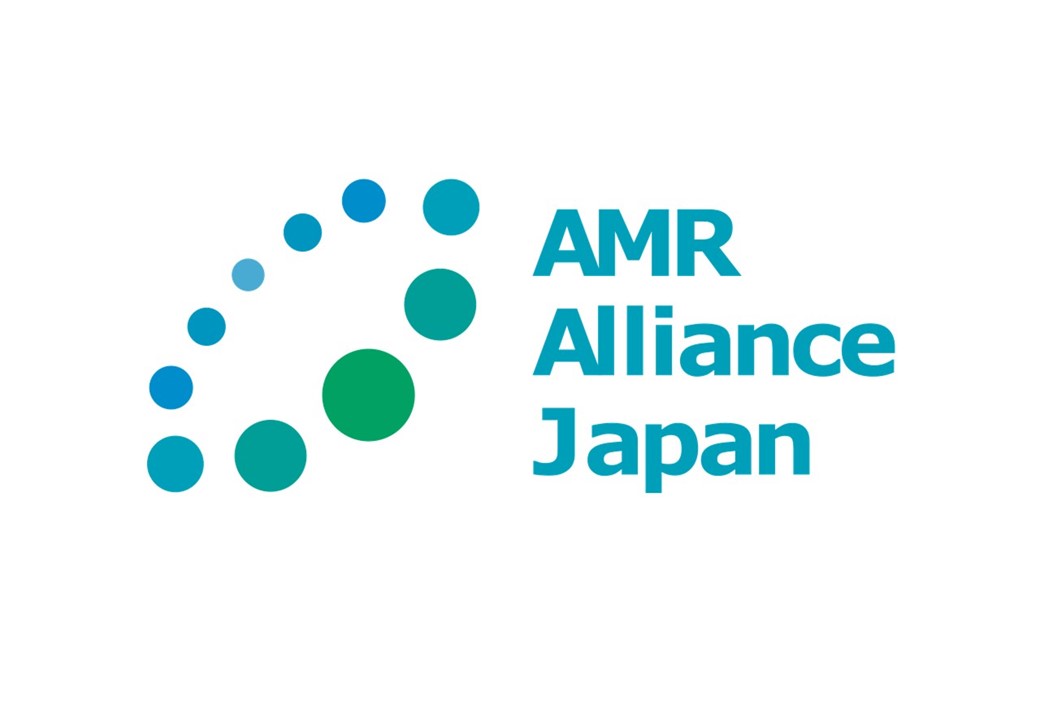
AMR Alliance Japan
Established in November 2018 by academic societies working in infectious disease medicine, pharmaceutical companies, and medical device makers, AMR Alliance Japan is an independent platform for the promotion of multisector discussion on AMR countermeasures. The Alliance develops and disseminates policy recommendations to: (1) ensure that AMR countermeasures are in line with the current situation of patients and healthcare settings; (2) promote the national and international AMR agenda; and (3) advance Japan’s AMR policy.
2023.05.26
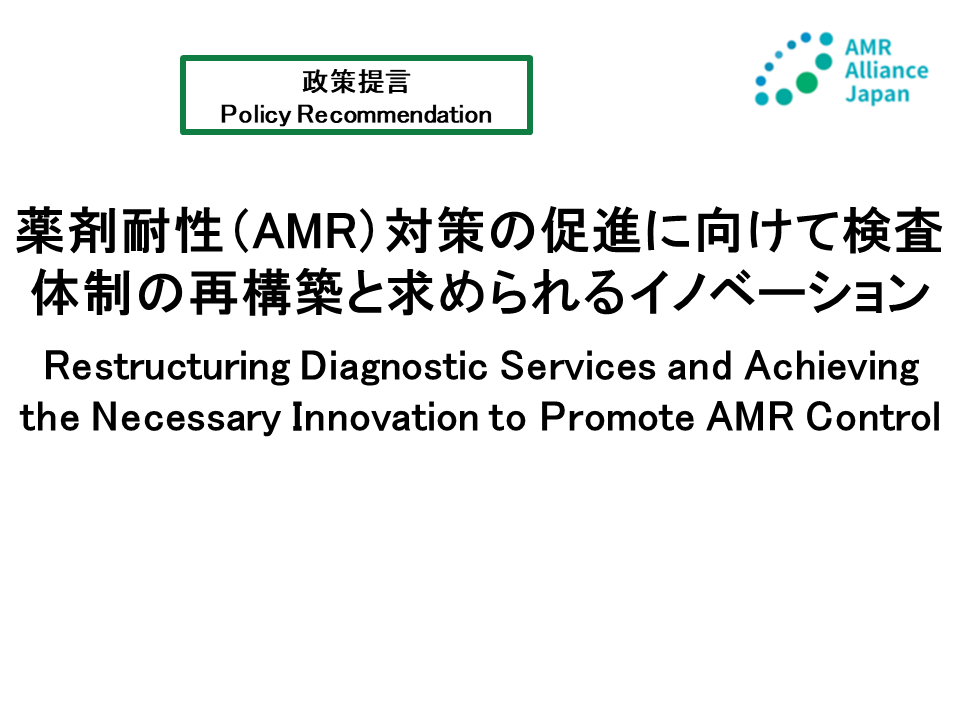
Recommendations
Restructuring Diagnostic Services and Achieving the Necessary Innovation to Promote AMR Control
AMR Alliance Japan aims to promote AMR measures, and have published a proposal on the reconstruction of the testing system that contributes to the diagnosis of antimicrobial resistant organism and the innovation required for that purpose.
Outline of the recommendations
- Recommendation 1: Reaffirm that testing plays a vital role in diagnostic support and restructure diagnostic services to advance AMR countermeasures that are also compatible with a super-aging society.
- Recommendation 2: Develop human resources and foster an environment to enable proactive AMR screening, microorganism identification, and drug susceptibility testing (including genetic testing).
- Recommendation 3: While taking conditions at healthcare institutions and in each region into account, consider new incentives to expand diagnostic services at healthcare institutions by promoting testing systems that can be implemented in-house or that will improve the positions of and profitability for in-house and external testing departments.
2023.05.24
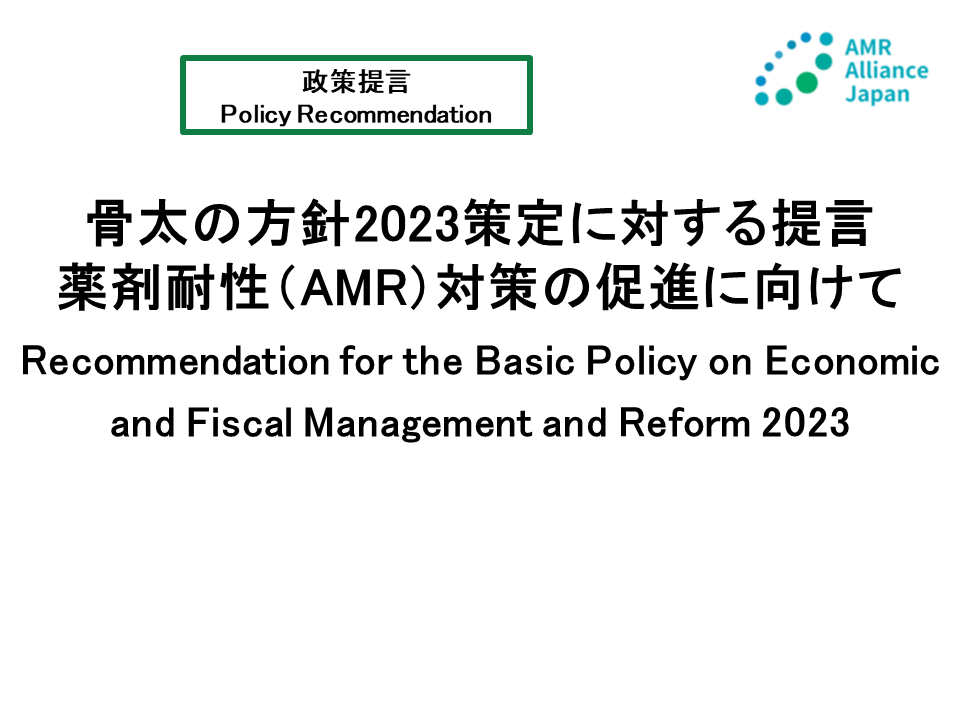 Recommendations
Recommendations
Recommendation for the Basic Policy on Economic and Fiscal Management and Reform 2023
AMR Alliance Japan released “Recommendation for the Basic Policy on Economic and Fiscal Management and Reform 2023” to promote infectious disease control measures to combat AMR. The content of the recommendations was as follows.
Promote countermeasures for antimicrobial resistance (AMR) with a One Health approach from perspectives including economic security and serve as a global leader in strengthening preparedness against the threat of infectious disease.
2023.04.28
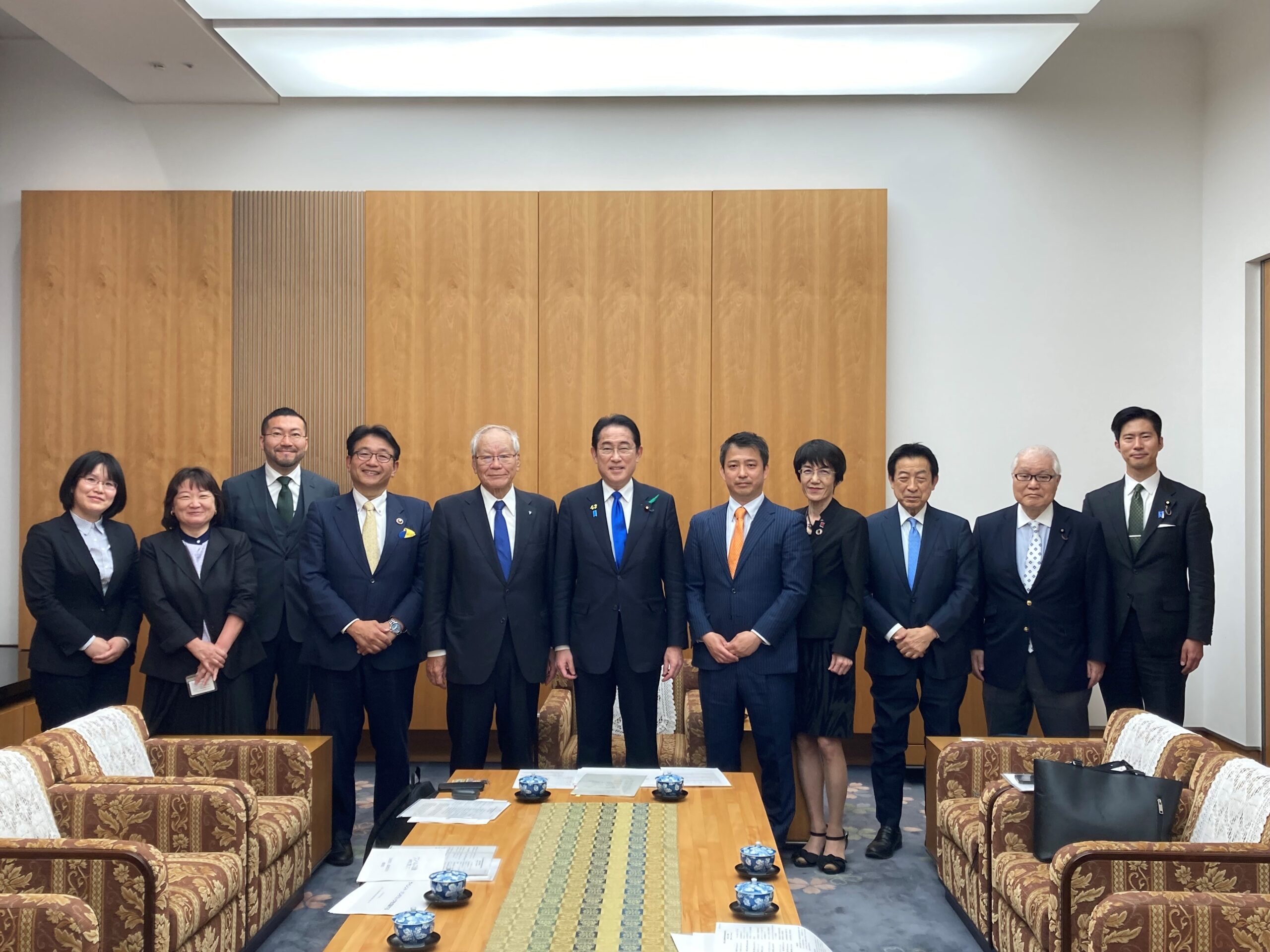
Recommendations to Prime Minister Fumio Kishida on the issue of AMR in the G7 Hiroshima Summit Leaders’ Declaration
Hoping to encourage action on AMR from Japan, a group of dedicated advocates presented recommendations to Prime Minister Fumio Kishida regarding the issue of AMR in the G7 Hiroshima Summit Leaders’ Declaration. Members of HGPI that participated in the meeting included CEO and Board Member Mr. Ryoji Noritake and Manager Ms. Yui Kohno.
Special Breakfast Meeting
2023.06.20
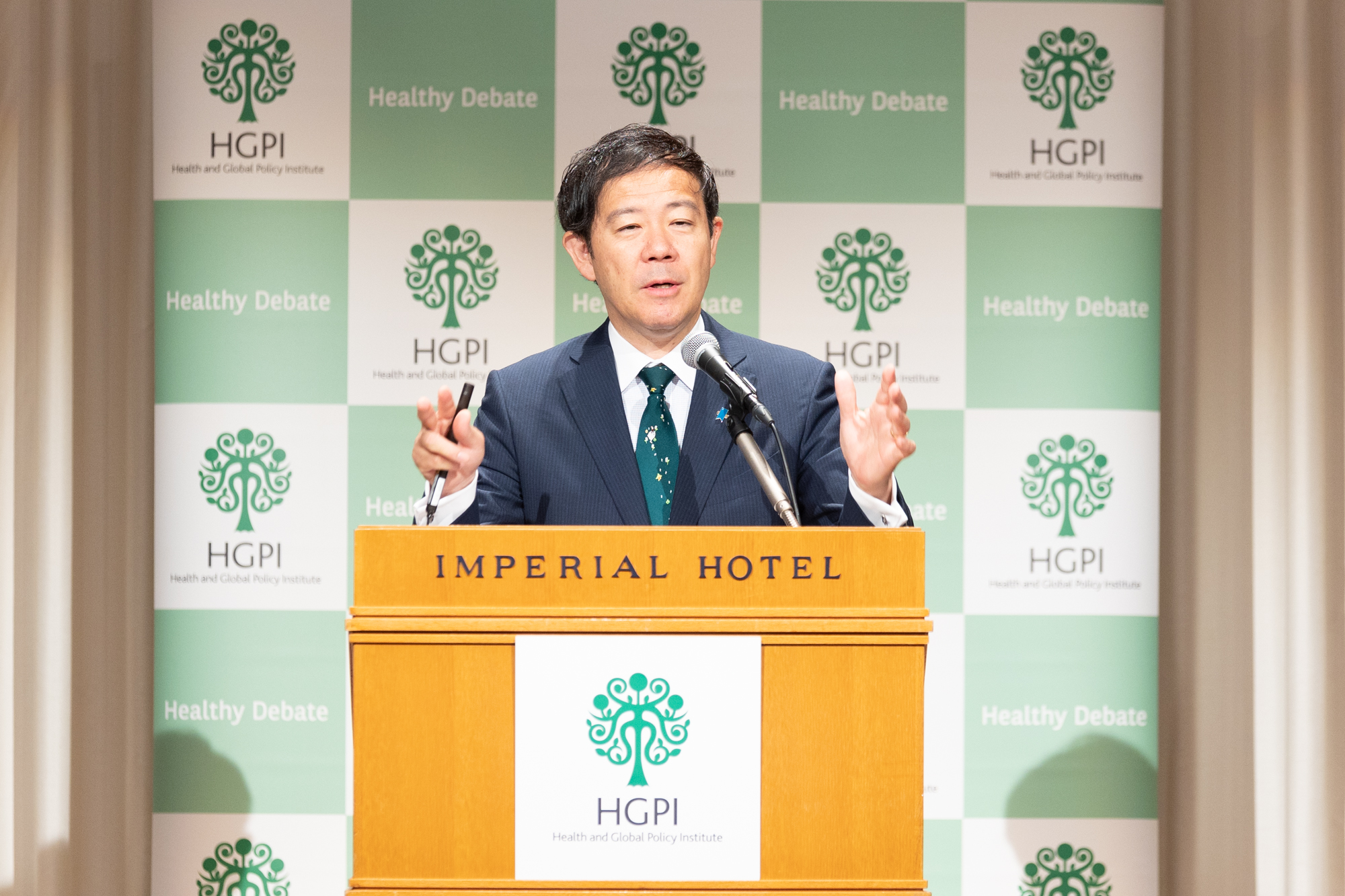
The 50th Special Breakfast Meeting
Based on the Basic Policies for Economic and Fiscal Management and Reform (honebuto no hōshin) 2023 — The Future of Health Care in Japan
We had the honor of hosting Mr. Hiroaki Tabata, a member of the House of Representatives and Director of the Liberal Democratic Party (LDP) Health, Labour and Welfare Division since August 2022. His lecture focused on the future of healthcare in Japan based on the Basic Policy on Economic and Fiscal Management and Reform 2023.
Key points of the lecture
- Trinity Labor Market Reform will be essential to complete labor market reforms, but there are significant obstacles to introducing them all at once in every industry and place of business. Instead, they must be introduced step-by-step in a combined manner that is tailored to each organization.
- The triple compensation revisions for long-term care, medical care, and welfare services for people with disabilities scheduled for FY2024, the legal revisions accompanying those revisions, and budgeting to secure financial resources for those revisions will be extremely important for building a sustainable social security system.
- Broad and frequent revisions to drug prices contribute to a weaker financial base for pharmaceutical companies and other companies. To reinforce drug discovery capabilities, it will be important to implement suitable assessments and for those assessments to also include patent periods. To ensure stable supplies of generic drugs, refinements to the structure of the industry must be made so it can develop and evolve.
Lectures and Media Coverage
HGPI’s projects have been covered by various media outlets both inside and outside of Japan.
2023.06.30
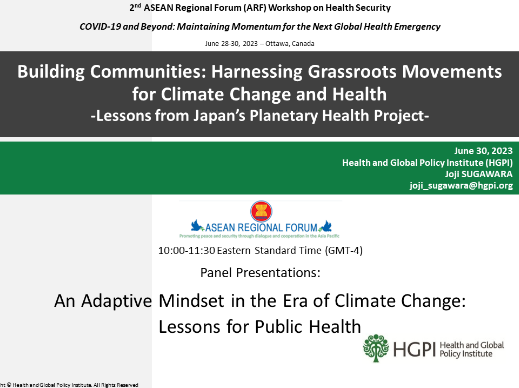 2nd ASEAN Regional Forum (ARF) Workshop on Health Security “COVID-19 and Beyond: Maintaining Momentum for the Next Global Health Emergency”
2nd ASEAN Regional Forum (ARF) Workshop on Health Security “COVID-19 and Beyond: Maintaining Momentum for the Next Global Health Emergency”
Building Communities: Harnessing Grassroots Movements for Climate Change and Health -Lessons from Japan’s Planetary Health Project-
Mr. Joji Sugawara, Vice President of HGPI, delivered a virtual presentation on the topic of planetary health titled “Building Communities: Harnessing Grassroots Movements for Climate Change and Health -Lessons from Japan’s Planetary Health Project-” and shared HGPI’s initiatives.
2023.05.12
IFPMA-JPMA Collaboration on Global Health Symposium
Proposals for the G7 Hiroshima Summit Health Agenda — Applying Lessons Learned from COVID-19 and Driving Progress Towards SDG3: a Roadmap for Action
HGPI Senior Manager, Prof. Haruka Sakamoto, facilitated the event.
2023.04.28
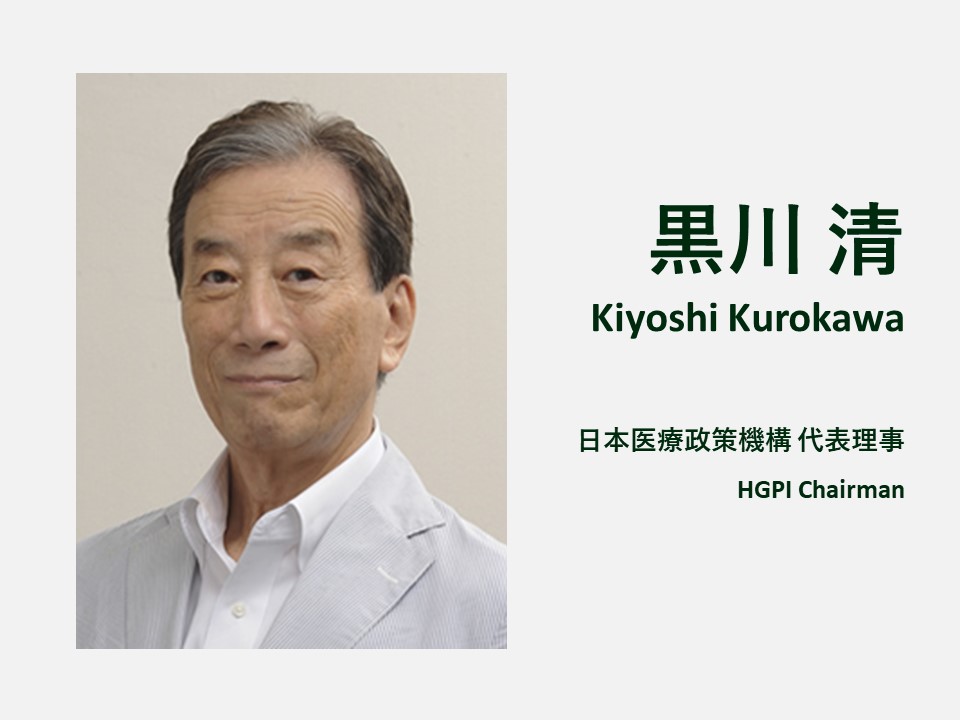
The 97th Annual Meeting of the Japanese Association for Infectious Diseases, The 71st Annual Meeting of the Japanese Society of Chemotherapy, Joint Conference, Invited Lecture
Critical Thinking
HGPI Chairman Dr. Kiyoshi Kurokawa, gave a lecture on the causes of the decline in academic research in Japan, problems in the research community, and messages to young researchers, based on the contents of his new book.
2023.04.27
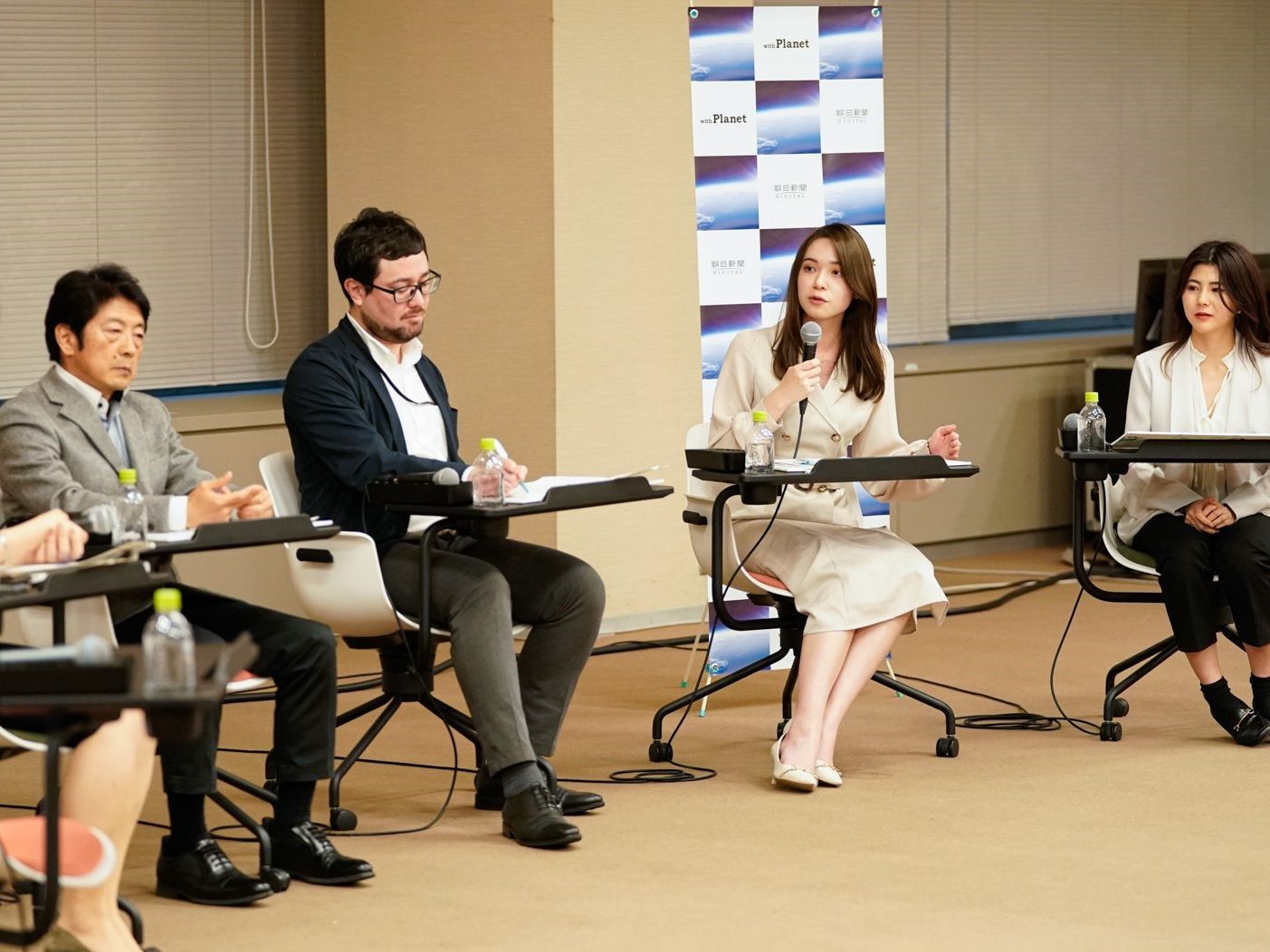
with Planet kick-off event
What Can I Do to Ensure the Health of the Planet?
with Planet, which operates under a media partnership between the Asahi Shimbun and the Bill & Melinda Gates Foundation, held its kick-off event, “What Can I Do to Ensure the Health of the Planet?” on April 27th, 2023. The Vice President of Health and Global Policy Institute (HGPI), Mr. Joji Sugawara, spoke at the event with other speakers from the Ministry of Health, Labour and Welfare (MHLW), the Global Health Technology Fund (GHIT Fund), and Health for all .jp.
2023.04.21
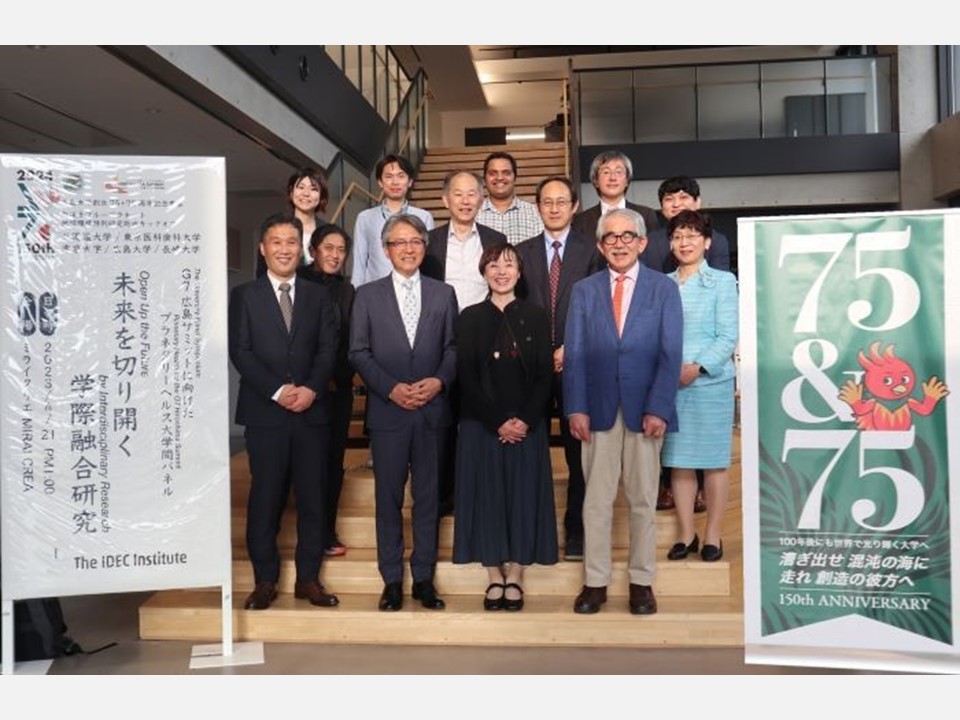
The University Panel Symposium on Planetary Health for the G7 Hiroshima Summit
Planetary Health for a Sustainable Global Environment: Open Up the Future by Interdisciplinary Research
HGPI supported The University Panel Symposium on Planetary Health for the G7 Hiroshima Summit “Planetary Health for a Sustainable Global Environment: Open Up the Future by Interdisciplinary Research.” at Hiroshima University on Friday, April 21, 2023, and Dr. Kiyoshi Kurokawa, Chairman of HGPI, delivered the guest remarks via video message.
Media Coverage
|
Yahoo JAPAN News |
|
The Asahi Shimbun Digital |
|
The Nikkan Yakugyo online |
|
Yomiuri Shimbun Online, The Nagasaki Shimbun, FNN Prime Online and more |
Advocacy Activities to Encourage the Adoption of the Recommendations in Our Policy Proposals

HGPI composes and publishes reports and policy proposals for each of its projects. HGPI also makes efforts to encourage the implementation of the recommendations contained in those publications through advocacy activities targeting the government and Diet. Those efforts include providing explanations on the content of each report and proposal to representatives from relevant departments with the local and national government or to Diet members and local assembly members on an individual basis. In addition to cooperating closely with parties relevant to each project from the local and national government, HGPI also functions as a hub that creates links within the community of experts in each field when creating content for Diet member study sessions or when drafting bills. We engage in these cooperative efforts with a shared intent of encouraging the implementation of concrete policies based on our recommendations. In the past, recommendations included in HGPI’s reports and policy proposals have been reflected in policies after having been cited in presentations made by various groups within the government, including nonpartisan Diet member groups and project teams, or in proposals composed by those groups.
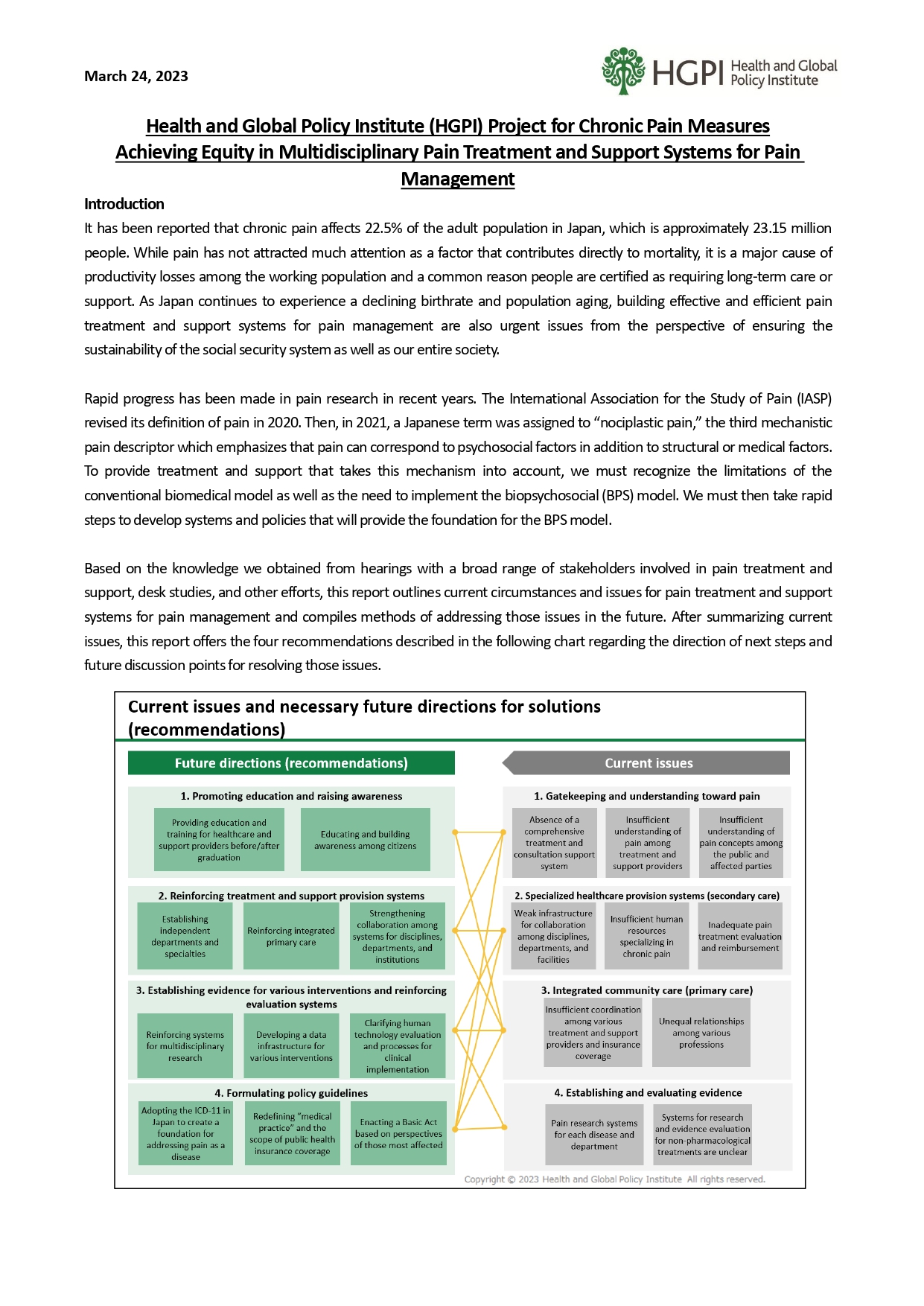
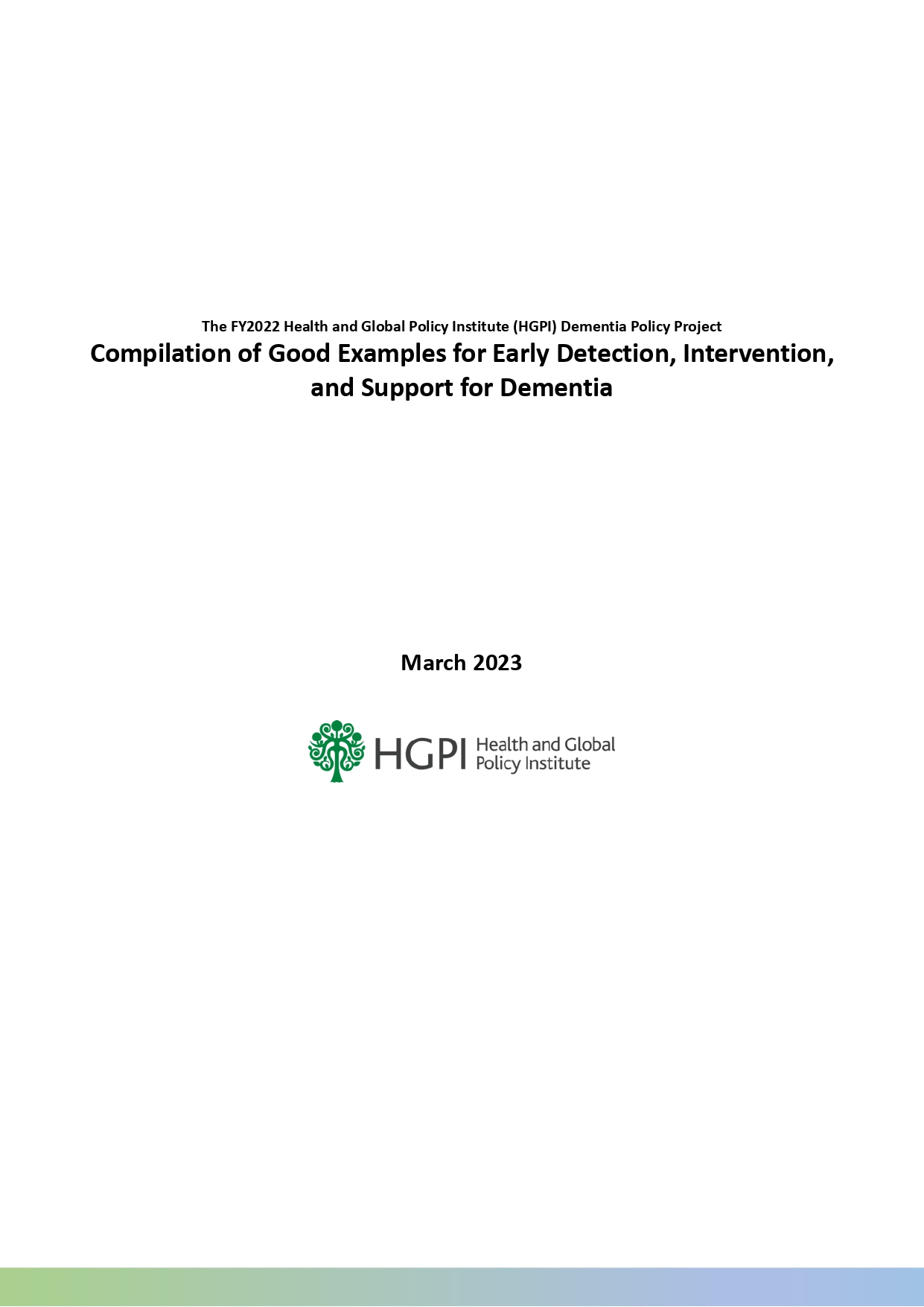
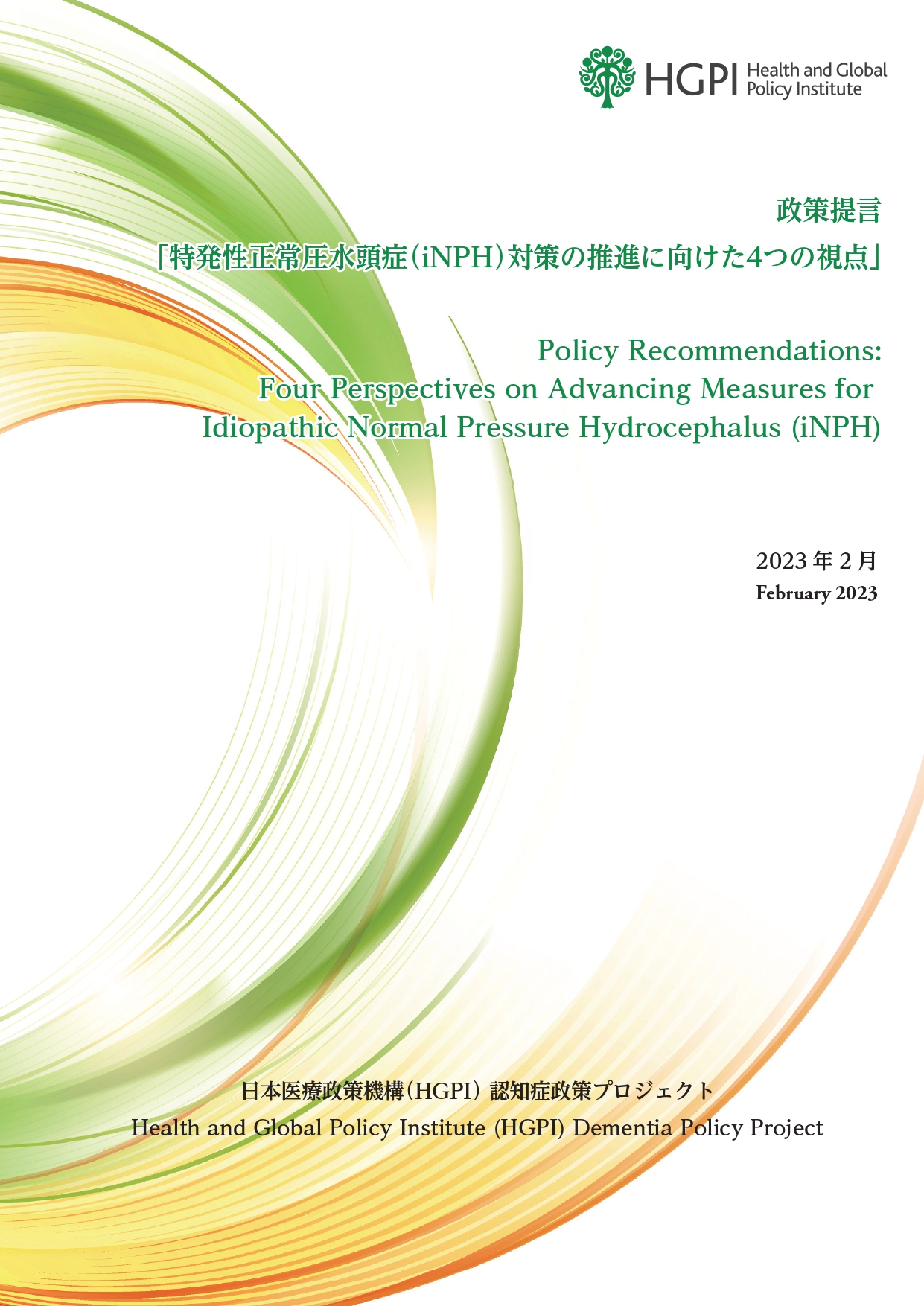
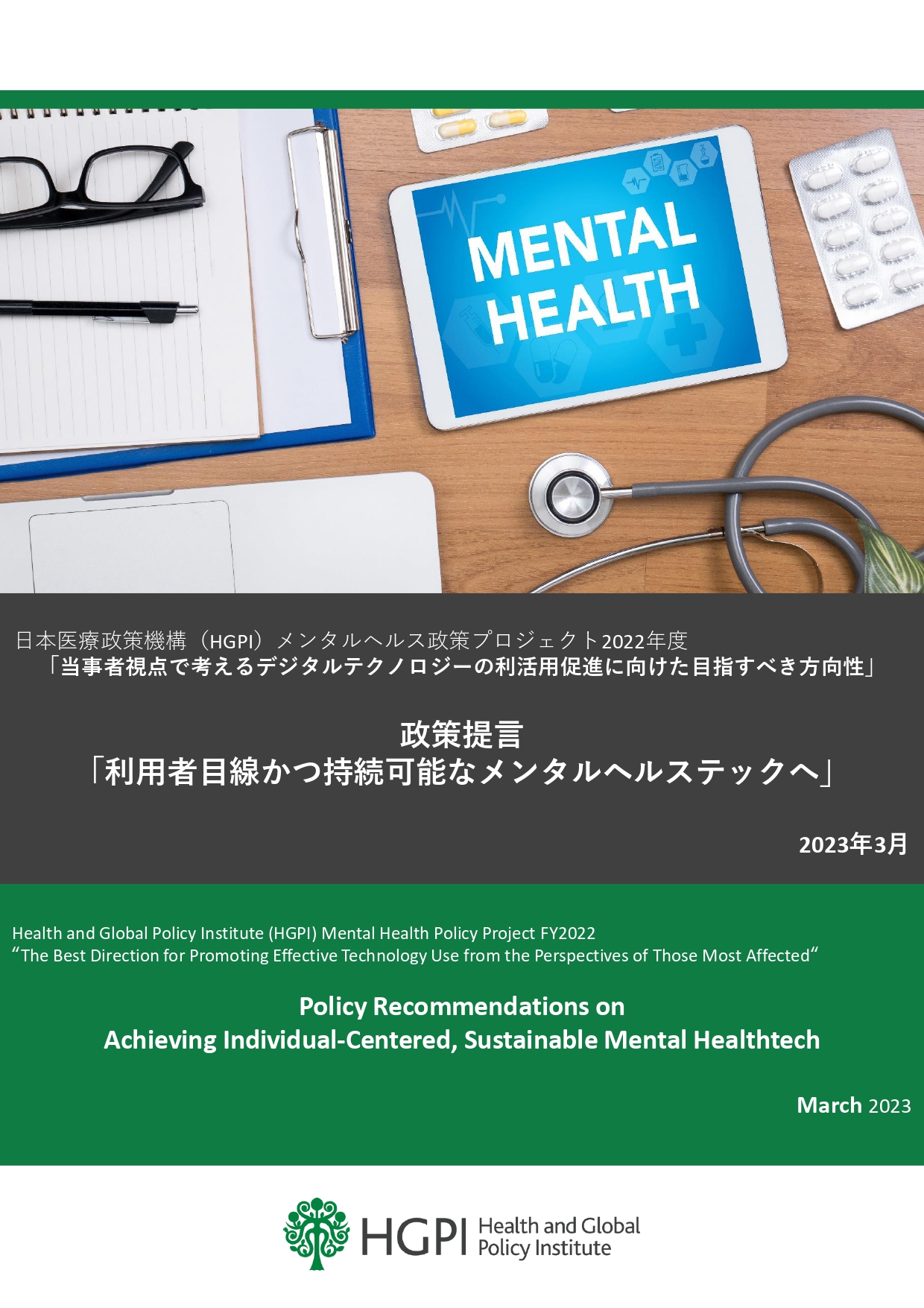

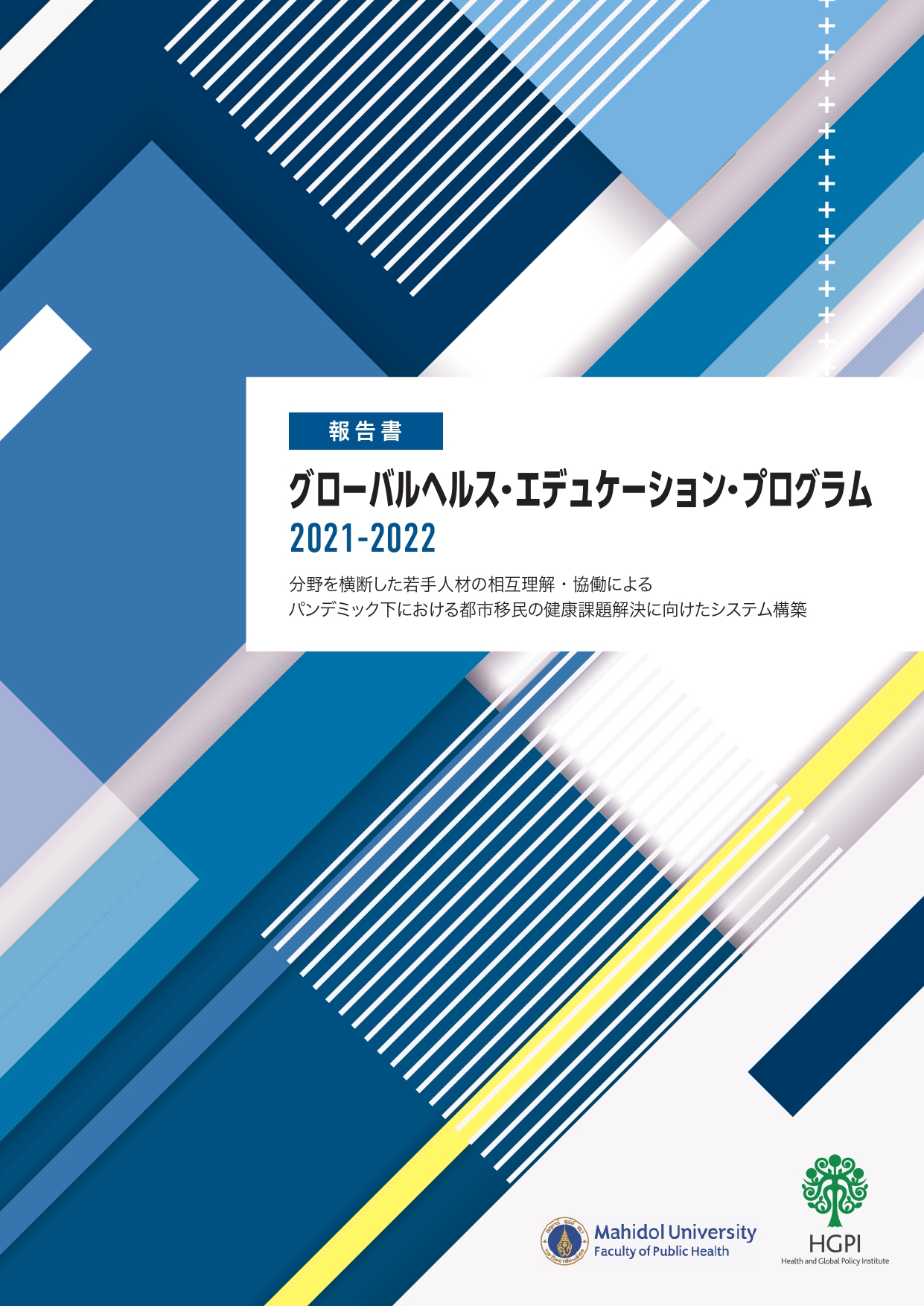
Providing Professional Expertise
Serving on Government Committees and Global Organizations
Senior members of HGPI have held various titles on government committees and in global health societies. Some of those titles are listed below.
- Kiyoshi Kurokawa: Member, World Dementia Council; Healthcare Policy Advisor, Cabinet Secretariat; Chairman, Council on the Future of Tokyo in a Super-Aged Society; Chairman, Cabinet Office’s AI Advisory Board, Special Advisors to the Cabinet, Chairperson, Hideyo Noguchi Africa Prize Committee
- Ryoji Noritake: Committee Member, Council on the Future of Tokyo in a Super-Aged Society
- Kohei Onozaki: Health Policy Advisor, Ministry of Health, Labour and Welfare; Social Security Team, Administrative Reform Conference, Cabinet Secretariat
- Yusuke Tsugawa: Council Member, Advisory Council on Large-scale Demonstration Projects for Prevention and Health Promotion, Ministry of Health, Labour and Welfare, Member, Study Group on the Review of Guidelines for the Appropriate Implementation of Online Medical Care, Ministry of Health, Labour and Welfare
- Ryozo Nagai: Member, Ministry of Health, Labour, and Welfare Social Security Council; Provisional Member, Council for Science and Technology, Ministry of Education, Culture, Sports, Science and Technology; Member, Cabinet Office’s AI Advisory Board
- Satoko Hotta: Member, Caregiver Fee Subcommittee and Welfare Division, Social Security Council, Ministry of Health, Labour and Welfare; Expert Committee Member, Policy Evaluation Council, Ministry of Internal Affairs and Communications
- Shinsuke Muto:Information Policy Advisor, Ministry of Health, Labour and Welfare



